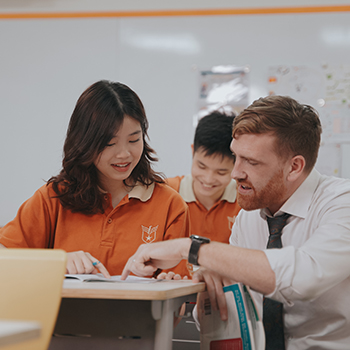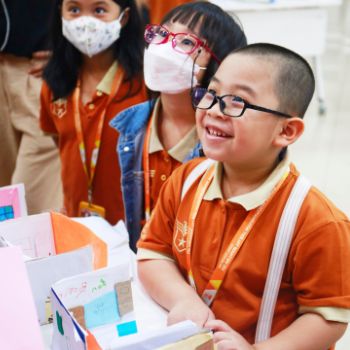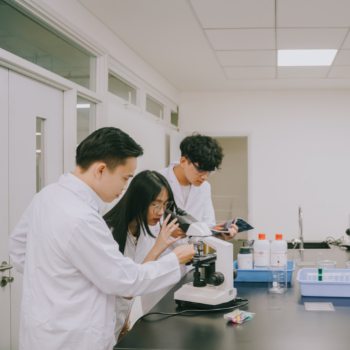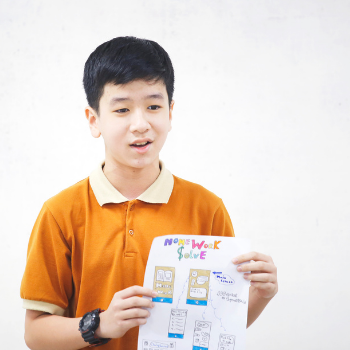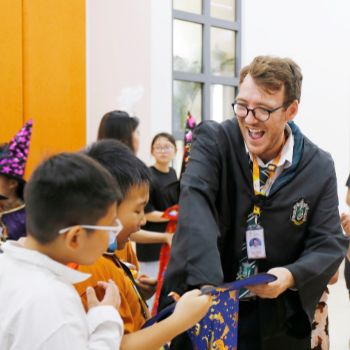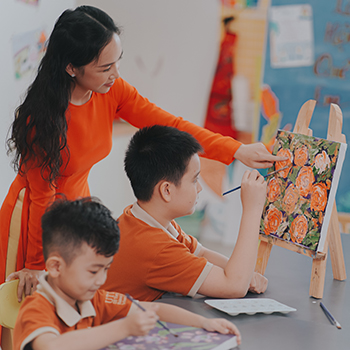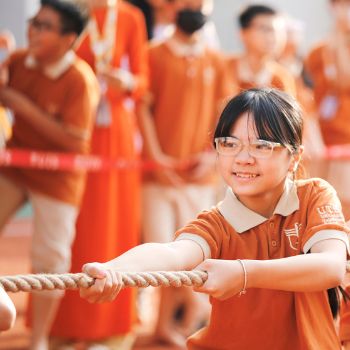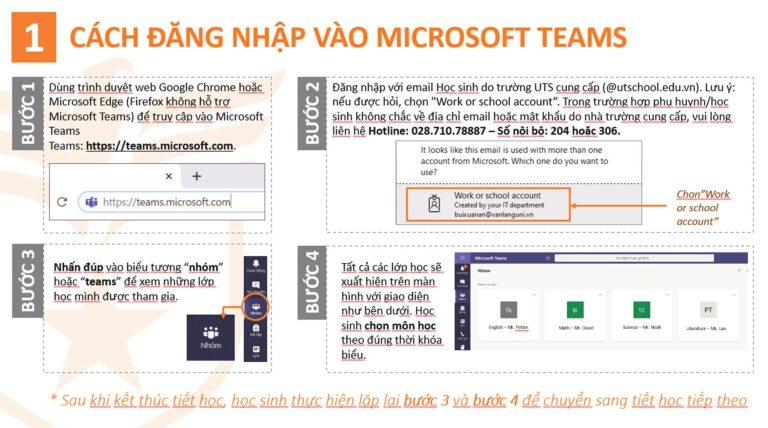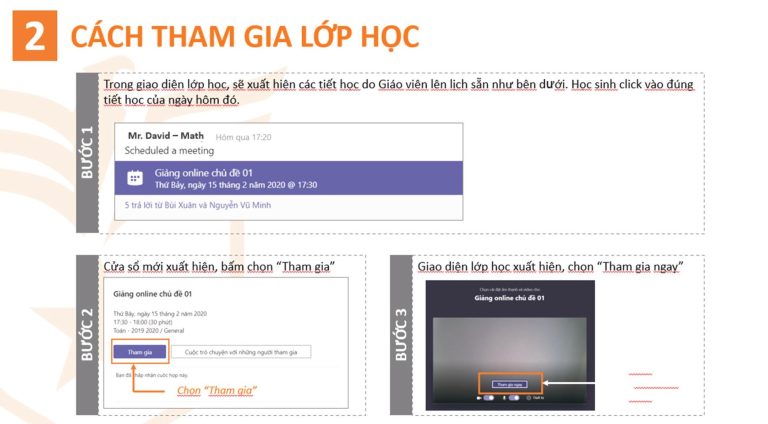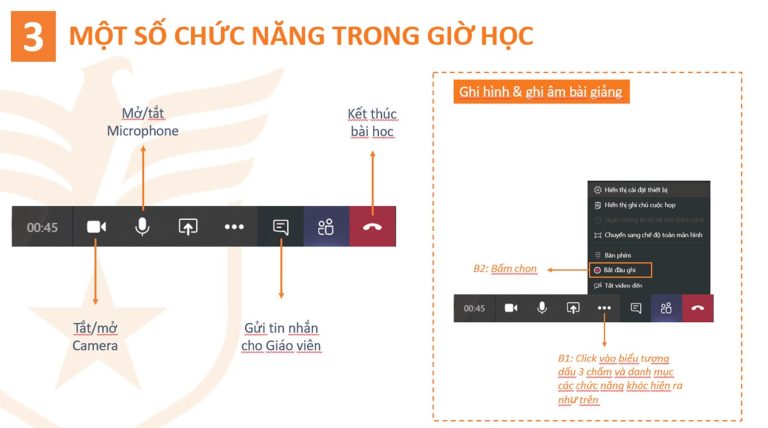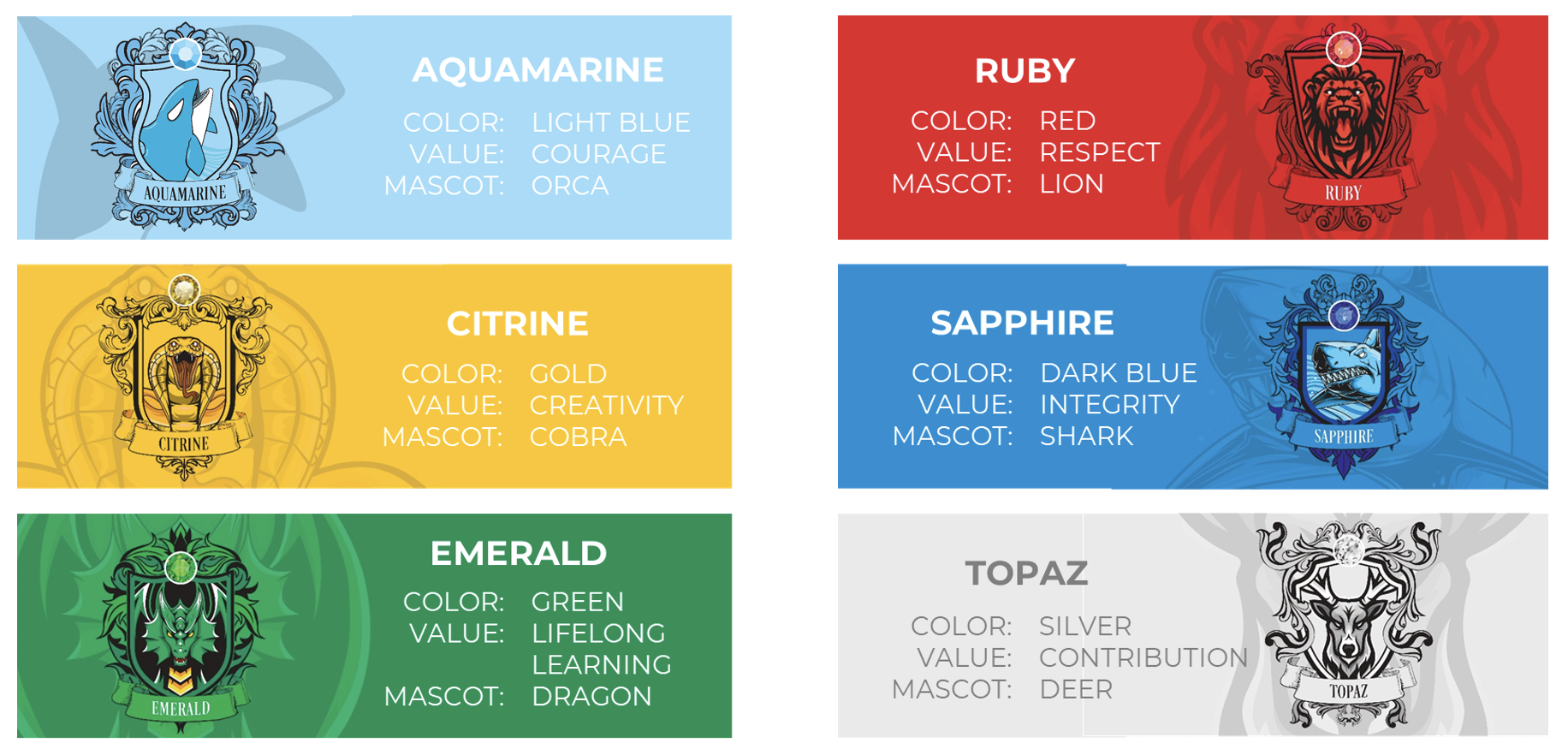If a student wishes to discontinue the meal service, parents are kindly requested to notify the Parent Liaison Office (PLO) via the hotline (028) 710 27788 or email office@utschool.edu.vn at least two (2) working days in advance, and complete the Self-Catering Confirmation Form.
Guidebook - Secondary
1. About UTS
1.1. Vision & Mission
1.1.1. Vision
Be the benchmark for the future-ready K12 education in Vietnam that shapes Global Citizens (by 2029)
1.1.2. Mission
Nurturing every heart and mind to GROW, LEAD and make a meaningful IMPACT.
1.2. Six core values
Integrity: UTS students are trustworthy, always uphold the truth, and say no to dishonest and wrongful behaviors in society.
Respect: UTS students respect themselves as well as others. In today’s global world, cultures are interconnected and blended together. Therefore, students need to understand and respect other cultures while maintaining their national identity and personal identity.
Courage: UTS students are patient, persistent, and have the spirit to conquer goals, face challenges, and boldly express their personal views with solid foreign language skills.
Contribution: UTS students apply the knowledge and skills they have learned to benefit themselves, their families, and society.
Lifelong Learning: UTS students continuously explore and learn from their surroundings and apply it to real-life situations.
Creativity: UTS students have a spirit of innovation and creativity, knowing how to develop and apply new ideas.
1.3. UTS Students Portrait
UTS aims to cultivate citizens who possess the following competencies and qualities:
SELF-INQUIRERS: Students nurture curiosity, develop lifelong learning skills, and engage in guided exploration and research. They are enthusiastic about learning and maintain a love for learning within a community that believes in a growth mindset and self-efficacy.
CRITICAL THINKERS: Students explore, absorb, analyze, and apply integrated knowledge from multiple fields. They use critical thinking skills to seek and evaluate viewpoints, as well as balance the physical, intellectual, and emotional aspects of life.
ACTIVE CREATORS: Students actively create information and knowledge, using innovative thinking to address and respond to the uncertainties of the world with sound reasoning and evaluation. They produce unique and breakthrough products, solutions, and ideas. Students persist in facing challenges and changes.
DEEP EMPATHIZERS: Students recognize, strive to understand, and appreciate differences and interdependence with people and the world around them. They cooperate to grow together and strive for common goals. Students demonstrate empathy, compassion, respect, and gratitude.
MEANING MAKERS: Students explore the true meaning and long-term purpose of learning for themselves and others. They act with integrity, optimism, and respect for the dignity of others. Students care about and connect with issues and ideas that are meaningful on a local, national, and global scale. They live responsibly and aim to serve the community, making a positive impact and inspiring the lives of others and the world around them.
1.4. Educational philosophy and forward-looking mindset
1.4.1. Educational philosophy
At UTS, our goal is to equip students for life in the 21st century by helping them develop a natural curiosity and a drive to explore, enabling them to become well-rounded individuals and lifelong learners. We believe that every child has the potential to be talented and should be recognized as such. Our job is to help them discover and cultivate their talents. UTS teachers play a crucial role in modeling and living out the core values.
We build and maintain strong connections with students and parents to gain a comprehensive understanding of each student’s skills, thinking, characteristics, and unique personality. This allows us to personalize care and education for each individual, helping to uncover, nurture, and develop their potential.
Our curriculum is deeply rooted in Vietnamese values and traditions, while also encouraging students to become global citizens prepared for an uncertain future. To achieve this, we combine an optimized national curriculum with an enhanced English program. The program emphasizes STEM capabilities, humanities, visual and performing arts, physical education, as well as social-emotional learning and lifelong learning skills.
1.4.2. Educational program
The school’s educational program is optimized with the goal of enhancing academic knowledge (through the optimized National Curriculum), strengthening students’ language and foreign language proficiency (through the English Program), and promoting skill development and character building (through the Talent Nurturing Program).
1.5. Global Citizenship and Multicultural Learning Declaration
1.5.1. Global Citizenship Declaration
According to the United Nations Convention on the Rights of the Child, all rights are important and must be protected, from the right to relax, freedom of speech, safety, and education to the right to be heard. Education is the foundation for achieving a sustainable society that respects the environment and human rights. UTS fosters global citizenship to raise students’ awareness and skills, promoting the United Nations Sustainable Development Goals (SDGs), such as no poverty (SDG 1), quality education (SDG 4), gender equality (SDG 5), clean water and sanitation (SDG 6), reduced inequalities (SDG 10), sustainable cities and communities (SDG 11), and climate action (SDG 13). Global citizens at UTS are committed to positive change, embracing diversity, and embodying the school’s core values.
Please refer to the full Global Citizenship Declaration and the Multicultural Learning and Community Declaration here.
1.5.2. Multicultural Learning and Community Declaration
Multicultural learning at UTS is not just a subject but a multidimensional aspect of education, encompassing awareness of the richness of various cultures, effective communication skills across cultural boundaries, empathy, and inclusivity, critical thinking, curiosity and openness, peaceful resolution of multicultural conflicts, and cultural humility. UTS’s multilingual and multicultural community, with its diverse teaching staff, provides rich experiences through extracurricular activities, cultural events, and community projects, helping students develop the multicultural competencies needed in a connected world.
Please refer to the full Global Citizenship Declaration and the Multicultural Learning and Community Declaration here.
1.6. High-Quality Teaching and Learning Statement
At UTS, we continuously strive to create a high-quality international bilingual environment that inspires the UTS community, including students, teachers, and staff, to become lifelong learners who are committed to becoming the best versions of themselves. We believe that high-quality teaching and learning help each individual grow socially, emotionally, physically, and intellectually.
Learners are equipped with multilingual skills, scientific thinking, creativity, and a desire for a bright future. The curriculum at UTS is a combination of the skills and knowledge framework outlined by the Ministry of Education and Training of Vietnam and international standards from the UK and the USA, aimed at nurturing students in a holistic educational environment that encompasses character development, social communication, and knowledge acquisition, all aligned with the school’s six core values:
- Creativity: Encourage students to develop their strengths and unique talents.
- Contribution: Students understand and value their roots, taking responsibility for the community from local to global levels.
- Courage: Encourage students to express their views, accept risks, and challenge the status quo.
- Integrity: Train students to face their mistakes and grow from the lessons learned.
- Lifelong Learning: Inspire students and staff to understand the value of education and to continuously seek knowledge.
- Respect: Students respect cultural differences, and the environment, and work towards building social justice.
Please refer to the full Declaration on High-Quality Teaching and Learning here.
2. General Information
2.1. Operating Hours
2.1.1. Academic Calendar
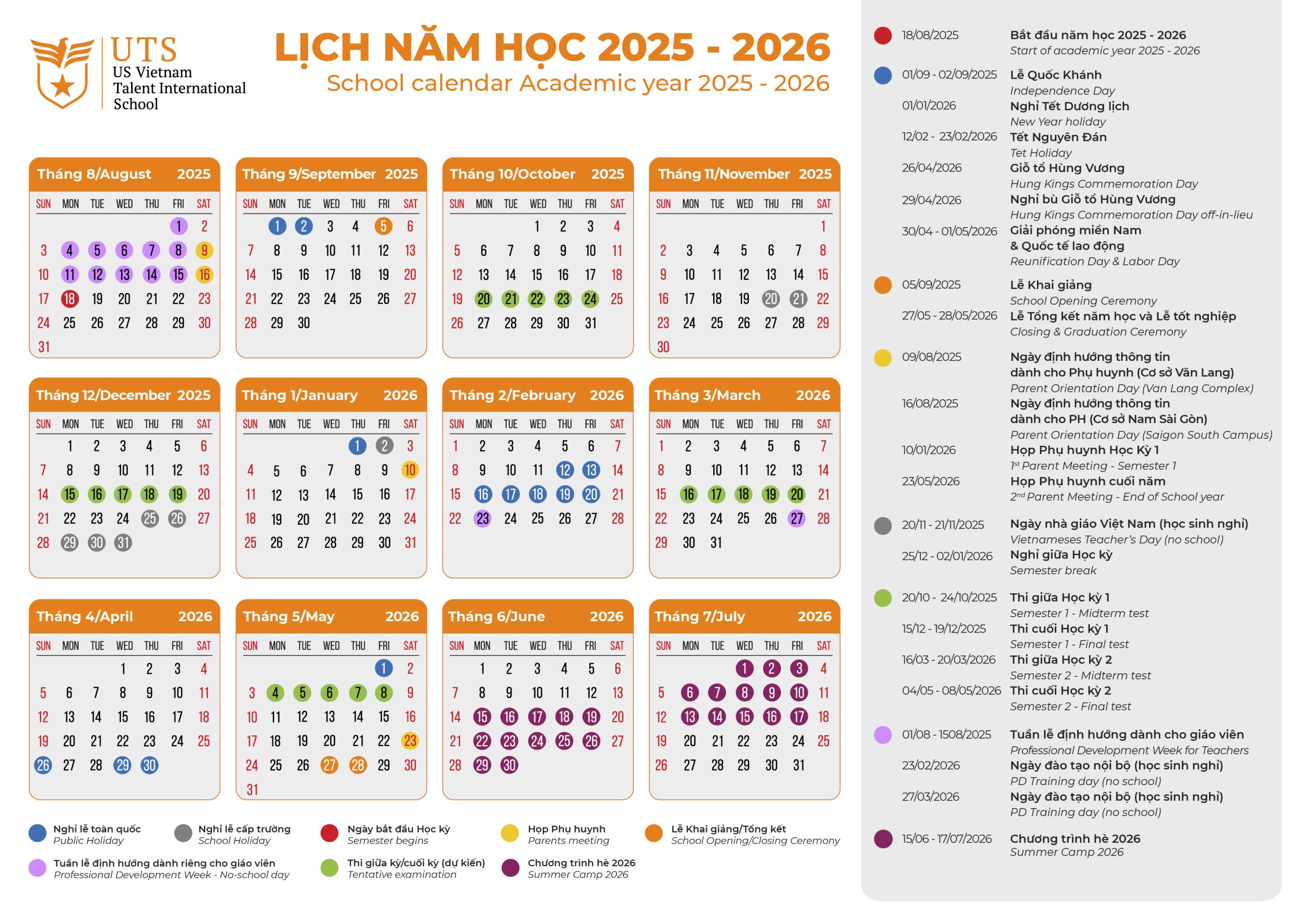
2.1.2. Office Operating Hours
Monday to Friday: 07:45 AM – 05:00 PM.
Saturday: 07:45 AM – 12:00 PM.
The school is closed on Sundays, public holidays, and official school holidays.
2.1.3. Daily Schedule
DIVISION |
Secondary School (40-minute periods) |
|---|---|
|
Breakfast |
7:00 - 7:30 |
|
Class Start Time |
7:50 |
|
Period 1 |
8:00 - 8:40 |
|
Period 2 |
8:40 - 9:20 |
|
Breaktime |
9:20 - 9:40 |
|
Period 3 |
9:40 - 10:20 |
|
Period 4 |
10:20 - 11:00 |
|
Period 5 |
11:00 - 11:40 |
|
Lunch & Nap time |
11:45 - 13:00 |
|
Self-study/Club |
13:00 - 13:20 |
|
Period 6 |
13:20 - 14:00 |
|
Period 7 |
14:00 - 14:40 |
|
Snack |
14:40 - 15:10 |
|
Period 8 |
15:10 - 15:50 |
|
Period 9 |
15:50 - 16:30 |
2.2. School Code of Conduct
2.2.1. School Entrance Regulations and Traffic Guidelines
GENERAL REGULATIONS:
- Everyone present on the school campus is required to wear their ID card at all times, without removing it, storing it in a pocket, or holding it in hand.
- Everyone entering the school campus is required to dress appropriately and maintain a neat appearance.
- UTS is a smoke-free school. The Security Department will document any violations and immediately halt any visits if this rule is breached.
REGULATIONS FOR TEACHERS, STAFF, AND STUDENTS:
- Comply with the general regulations.
- Adhere to the use of the issued ID card for entering and exiting the school and declare any belongings (if applicable) as per the regulations.
- Procedure for forgetting the ID card: Complete the information declaration through an online form at the security gate to receive a temporary card.
- If students need to leave the school outside of regular dismissal hours, they must obtain written permission from both the Homeroom Teacher and the Discipline Officer via an “Early Dismissal Permission Form” and must be accompanied by a Parent/Guardian.
REGULATIONS FOR PARENTS:
- Comply with the general regulations.
- Parents picking up or dropping off students must use the pick-up/drop-off card issued at the beginning of the school year or at the start of the student’s enrollment at UTS to complete the entry/exit procedures along with the student.
Procedure for parents: When parents need to enter the school campus outside of pick-up/drop-off hours, they must inform the Security personnel of their purpose for entering the school. The security staff will verify the purpose, and then parents must use their Parent ID card at the Security Gate to gain entry. In cases where parents do not have their card, the following procedure must be followed to enter the school campus:

Explanation:
Steps |
Contents |
|---|---|
|
1 |
Parents contact the Security Guard at the security gate |
|
2 |
Security Guard confirms Parent information with Teachers or Related Departments |
|
3 |
After confirmation, Parents need to hand over their ID cards to Security Guard. Security Guard records corresponding information. |
|
4 |
Security Guard issues temporary gate-access card to Parents |
|
5 |
Security Guard, Teachers, or Related Departments guide Parents to enter the school campus, to the exact location After completing the visit to the School, Parents return to the Security room, return the temporary gate-access card and receive their ID cards. |
GUIDELINES FOR VISITORS
1. Comply with general regulations.
2. Visitor reception time at the school: 8:00 – 11:00 & 14:00 – 16:00.
3. Visitors, partners, … (hereinafter referred to as “visitors”) must make an appointment before visiting. The relevant department must notify the Security Department of the visitor’s appointment at least 01 (one) hour before the appointment time. The Security Department is allowed to refuse/postpone/reschedule if there is an overlap with important student activities or if the visit affects the general security situation of the whole school. For visitors who have not made an appointment, the relevant department is responsible for confirming and receiving guests at the entrance gate area.
4. Visitors must check in/out at the entrance gate.
5. Classroom area + Function rooms and swimming pool: only visit facilities in empty areas to avoid affecting students’ study time and activities.
6. Canteen area: visit when the canteen is empty, please do not visit when students are having breakfast + lunch + afternoon meals. Do not visit the kitchen area.
7. Do not take pictures of students, staff, or teachers while participating in school activities without the consent of the parents/guardians of those students, staff, or teachers. The security department will remind or apply security regulations depending on the level of violation.
8. Use the designated restroom area for each subject (adults, children) on each floor.
9. Visitors must move according to the instructions of the department, reception department.
2.2.2. Transportation and Traffic guidelines
Transportation on campus
MOTORBIKES
UTS requires all motorcyclists to wear helmets at all times. Students are only permitted to use vehicles that comply with the law.
The maximum speed limit for motorcyclists on campus is 5km/h.
ROLLER SKATES/SKATEBOARDS/BICYCLES/REMOTE CONTROLLED AERODROMES
Roller skates/skates/remote control drones are not permitted on campus.
Bicycles are not permitted for recreational/sporting purposes on campus.
PARKING
In order to ensure traffic safety and order within the campus, all vehicles must comply with the traffic flow regulations as well as the parking area as designated by the School.
In order to ensure traffic safety and order within the area, all vehicles must comply with the one-way traffic regulations, as well as park in the area designated by the School/Urban Area Management Board.
Traffic guidelines
Traffic Guidelines at UTS Van Lang Campus:
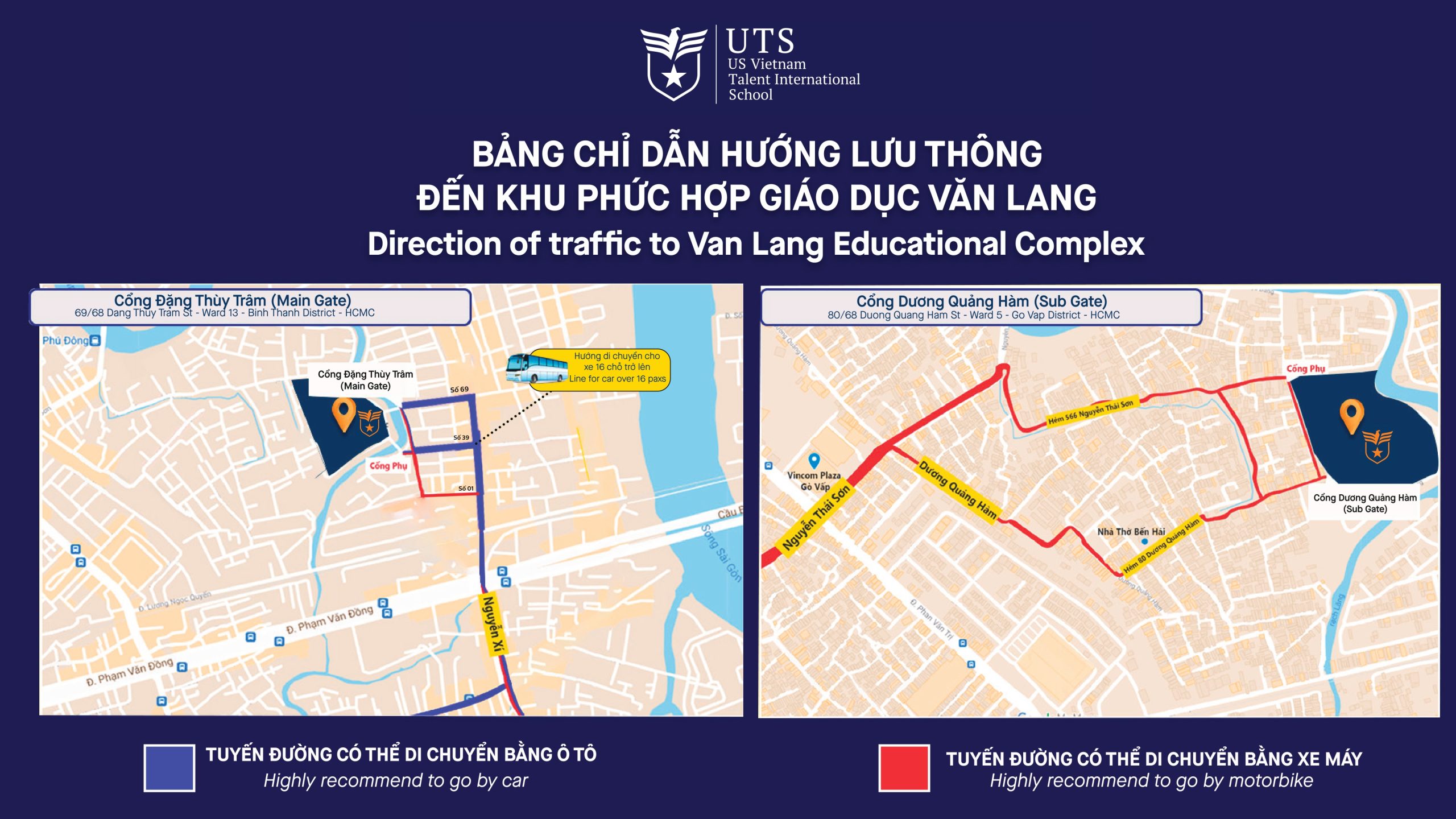
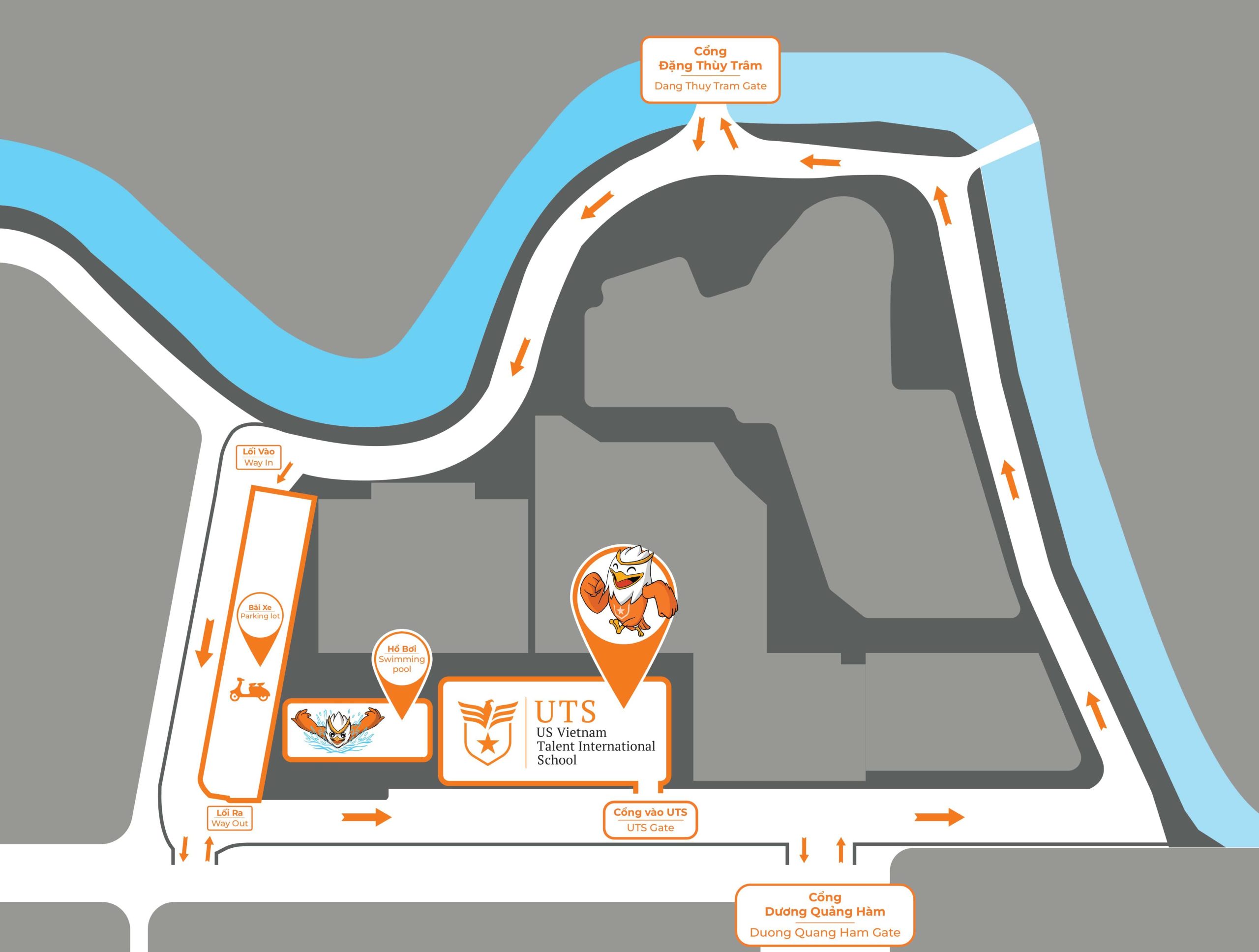
Traffic Guidelines at UTS Saigon South Campus:
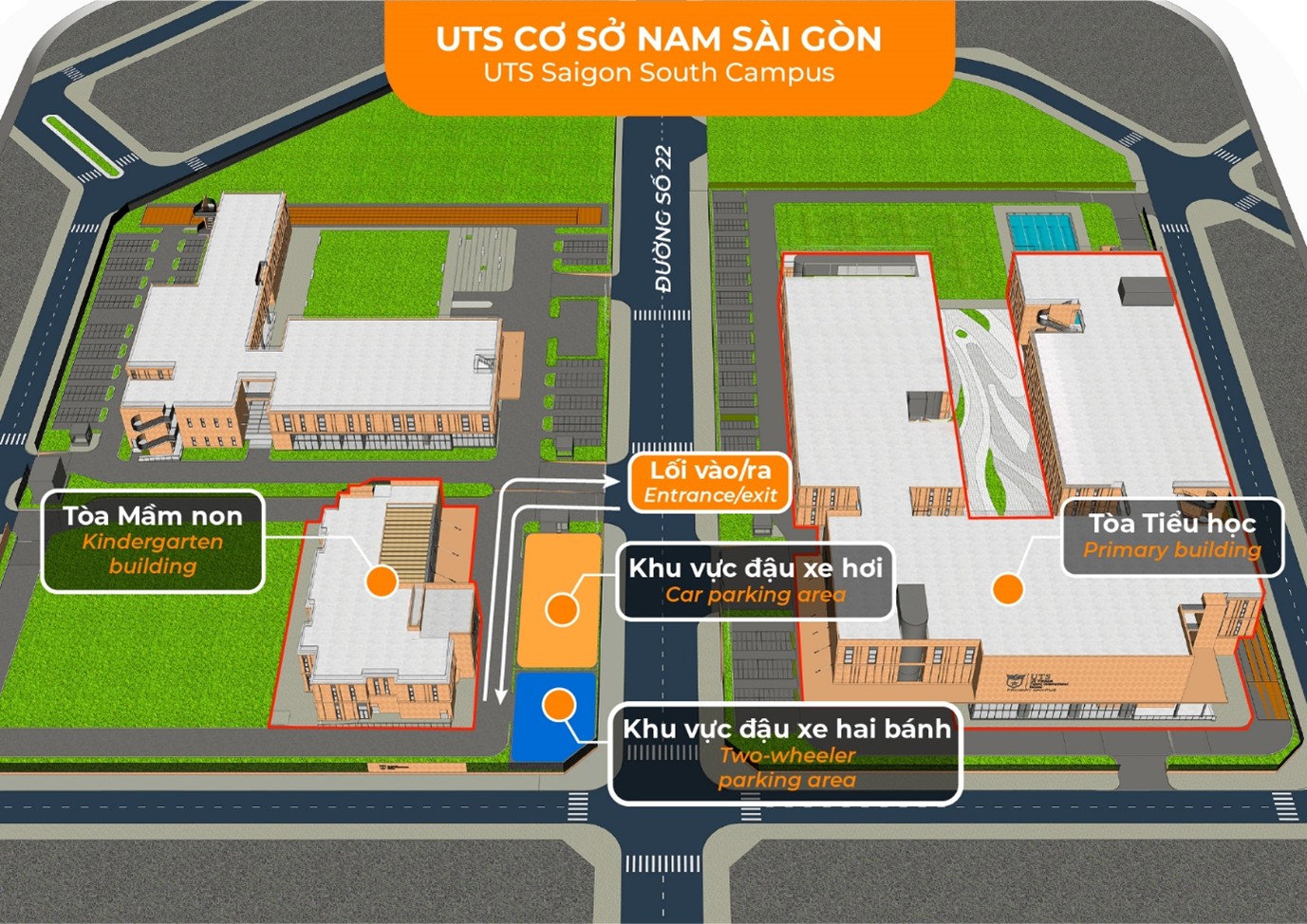
2.2.3. Student Drop-off and Pick-up Procedure
Students who leave school on their own must depart before 5:15 p.m. Once they have exited the school gate, they are not permitted to return to campus unless there is a special need. In such cases, students must complete the re-entry registration procedure at the UTS main gate.
2.3. . School-Family Communication
2.3.1. Process for Receiving and Handling Requests and Inquiries
. Inquiry and Complaint Handling Process
PROCEDURE FOR RECEIVING AND PROCESSING INQUIRY AND REQUESTS FROM STUDENTS’ PARENTS
During the time the student is studying at UTS, if the Parents have any problems, requests, questions, or need support to register for services, the Parents can contact the Parent Liaison Office (PLO) according to the contact information below:
– Phone number: 028 71027788
– Email: office@utschool.edu.vn
The process for handling requests, questions, or complaints is as follows:

Explanation:
Steps |
Contents |
|
|---|---|---|
|
1 |
Parents send requests, questions or complaints via contact channels such as hotline, email, or directly to PLO. |
|
|
2 |
PLO specialists respond to parents through contact channels such as hotline, email, or in person. |
within 24 hours |
|
3 |
If necessary, PLO will meet with relevant department heads to agree on a response plan for parents. |
within one (01) week |
|
4 |
After agreeing on the solution, PLO records the information and completes the processing. |
2.3.2. School-Family Communication
OFFICIAL INFORMATION CHANNELS OF THE SCHOOL
- ManageBac
ManageBac is one of the leading learning management software used in international schools around the world. At UTS, ManageBac is designed for Primary and Pre-Primary students to effectively support curriculum development, assessment and reporting. Additionally, ManageBac helps to strengthen the connection between schools, parents and students.
- Transparent Classroom (Kindy)
Transparent Classroom is a tool to support the teaching and information needs specifically for Early Years at UTS.
- Parent Liaison Office: PLO’s email address ends with utschool.edu.vn
The Parent Liaison Office is the department that receives and handles parents’ issues and questions related to school activities..
- Email: office@utschool.edu.vn
- Phone number: 028 710 27788 – Line 1
- SMS/ZNS
SMS/ZNS is only for the purpose of reminding Parents to check information on ManageBac/email or urgent information.
- Website
The School website: www.utschool.edu.vn is the official information page where Parents can find general information about the school, facilities, teaching staff, and curriculum. Parents can access the website to see timetables, event schedules, and the latest news.
- Fanpage
The School’s Facebook page is a place to share photos and videos of student activities at UTS. The School recommends that if Parents have any comments, questions or concerns, please contact the Parent Liaison Office (PLO) and the school directly for answers instead of posting on social media channels when there is not enough accurate information..
2.3.2.2. RECEIVE INFORMATION FROM SCHOOL
General principles:
- Official information from the School is announced through the above mentioned official channels
- Announcements, both academic and school service information, will be sent from ManageBac and to parents’ email accounts
- Parents are requested to check notifications on these platforms for timely updates.
2.3.2.3. OTHER SUPPORT REQUESTS
| No. | Types of Request | Reception Department |
| ACADEMIC | ||
| 1 | Notice of absence | Parents directly register for student’s leave on the ManageBac system |
| 2 | Register for school transfer and support student related documents | Parent Liaison Office (PLO) |
| 3 | Support participation in school competitions and activities |
– Homeroom teachers – Parent Liaison Office (PLO) |
| 4 | Instructions to use learning support platforms and services | Parent Liaison Office (PLO) |
| 5 | Ask about student’s learning situation | Homeroom teachers |
| 6 | Give feedback/complaints about teaching quality, service quality | Parent Liaison Office (PLO) |
| OTHERS | ||
| 1 | Register to change school services: pick-up, meals, etc. | Parent Liaison Office (PLO) |
| 2 | Register new information for school services: cards, pick-up people… | Parent Liaison Office (PLO) |
| 3 | Give feedback/complaints about school service quality | Parent Liaison Office (PLO)) |
| 4 | Find lost items | Parent Liaison Office (PLO) |
| 5 | Send medicine to students | Parent Liaison Office (PLO) |
| 6 | Fee requests: payment, refund, fee notification… | Parent Liaison Office (PLO) |
| 7 | Student image requirements | Parent Liaison Office (PLO) |
2.3.3. UTS Parent Representatives Group
UTS Parent Representatives Group
At UTS, the Parent Representatives Group acts as the official representative for all UTS Parents, providing resources to support and contribute to the improvement of learning and teaching quality, and the creation of a safe and healthy learning environment for our students. This is part of the School’s commitment to enable Parents to actively participate and engage in their children’s learning, and to contribute to the School’s continuous improvement process..
The Parent Representatives Group will act as an open forum to receive constructive comments, views, and concerns (if any) from Parents. In addition, the Parent Representatives Group will also play an important role as a powerful support resource in supporting UTS Community’s activities and events. Active cooperation between the School and Parents will be the key to a safe, dedicated and creative learning environment that the School always strives to achieve..
3. School Life
All teachers and staff at UTS aim to build a safe, caring and creative learning environment that inspires all students to develop their talents and character so that they become well-rounded lifelong learners and compassionate leaders who contribute to changing the world for the better.
A clear Code of Conduct will play a key role in the success of teaching and learning. On that basis, this Code is designed with the following objectives:
- Set expectations for appropriate student behaviors that help create a positive and safe learning environment.
- Promote early intervention and prevention of bullying.
- Ensure fairness and consistency in rewarding and managing student behaviors.
- Ensure the school’s educational strategy is widely communicated and understood.
The school expects to receive close cooperation from parents and students to achieve the highest codes of conduct inside and outside of school.
3.1. Behavioral Standards at UTS
7 “UTS best behaviors” are designed to help students remember and practice positive behaviors at any time on campus.
- Behave in a civilized manner, respect differences
- Dress and appear in accordance with regulations
- Always be on time at the beginning of the day and at the end of class
- Maintain personal hygiene and general hygiene
- Maintain appropriate volume in all areas
- Prepare supplies, complete homework
- Safeguard personal and school property
3.2 Expected Behaviors
The school’s positive student behavior expectations are based on the UTS student profile and are described in Table 1.
SELF-LEARNER
Students nurture curiosity and develop lifelong learning skills to independently explore and research with direction. They are enthusiastic about learning and maintain a passion for education within a community that believes in growth mindset and self-efficacy. The spirit of self-directed learning helps students develop time management skills and enhance independence. Self-learning extends beyond school and accompanies individuals throughout their lives, preparing them to face changes and challenges effectively.
– Arrive in class on time, and prepare all necessary books and learning materials.
– Actively contribute to class discussions.
– Participate actively in learning activities, projects, and initiatives.
– Complete all assigned tasks both in class and at home.
– Have a thorough review plan before assessments and be honest in examinations.
CRITICAL THINKER
Students explore and acquire, analyze, and apply integrated knowledge from various fields. They use
critical thinking skills to seek and evaluate perspectives, as well as to manage and balance physical,
intellectual, and emotional aspects of life. The ability to think critically helps students solve problems
effectively in both learning and daily life. A critical thinker sets goals and develops plans based on
scientific principles, contributing to achieving expected success.
– Actively think about the questions and issues raised around the lesson to find solutions.
– Continuously seek solutions to address problems in the classroom, school, and community.
– Develop a scientific lifestyle, recognizing and enhancing strengths while addressing weaknesses.
– Maintain good personal relationships and contribute to building positive relationships within the community.
– Evaluate the accuracy of information and use information sources effectively in practice.
ACTIVE CREATOR
Students actively create information and knowledge, using innovative thinking to address and adapt
to a world full of uncertainties with sound reasoning and evaluation. They develop unique and
groundbreaking products, solutions, and ideas. Students persistently face challenges and changes.
Creative students often propose novel and interesting ideas, enriching learning and extracurricular
activities. Creativity not only helps them stand out but also fosters a spirit of innovation within the
community.
– Participate in debate activities related to learning.
– Be eager to learn, explore, and research to deepen and expand knowledge.
– Engage in scientific research projects.
– Develop ideas for school house activities, class initiatives, and school-wide programs.
– Flexibly use learning methods that positively impact oneself and support peers’ progress.
– Design learning products (such as presentations, project ideas, etc.) creatively.
– Use information technology safely and effectively in communication and learning, and
quickly adapt to technological innovations.
DEEP EMPATHIZER
Students acknowledge, strive to understand, and appreciate the differences and interdependence with people and the world around them. They collaborate to grow together and work towards common goals. Students demonstrate empathy, compassion, respect, and gratitude. Empathy helps students build positive personal relationships and contribute to creating a cohesive and harmonious social environment. With empathy, they resolve conflicts gently and effectively, always seeking to create consensus and reconciliation.
• Students show respect by maintaining their personal appearance through attire and grooming. Specific guidelines on uniforms, footwear, and appearance are detailed in the following pictures:
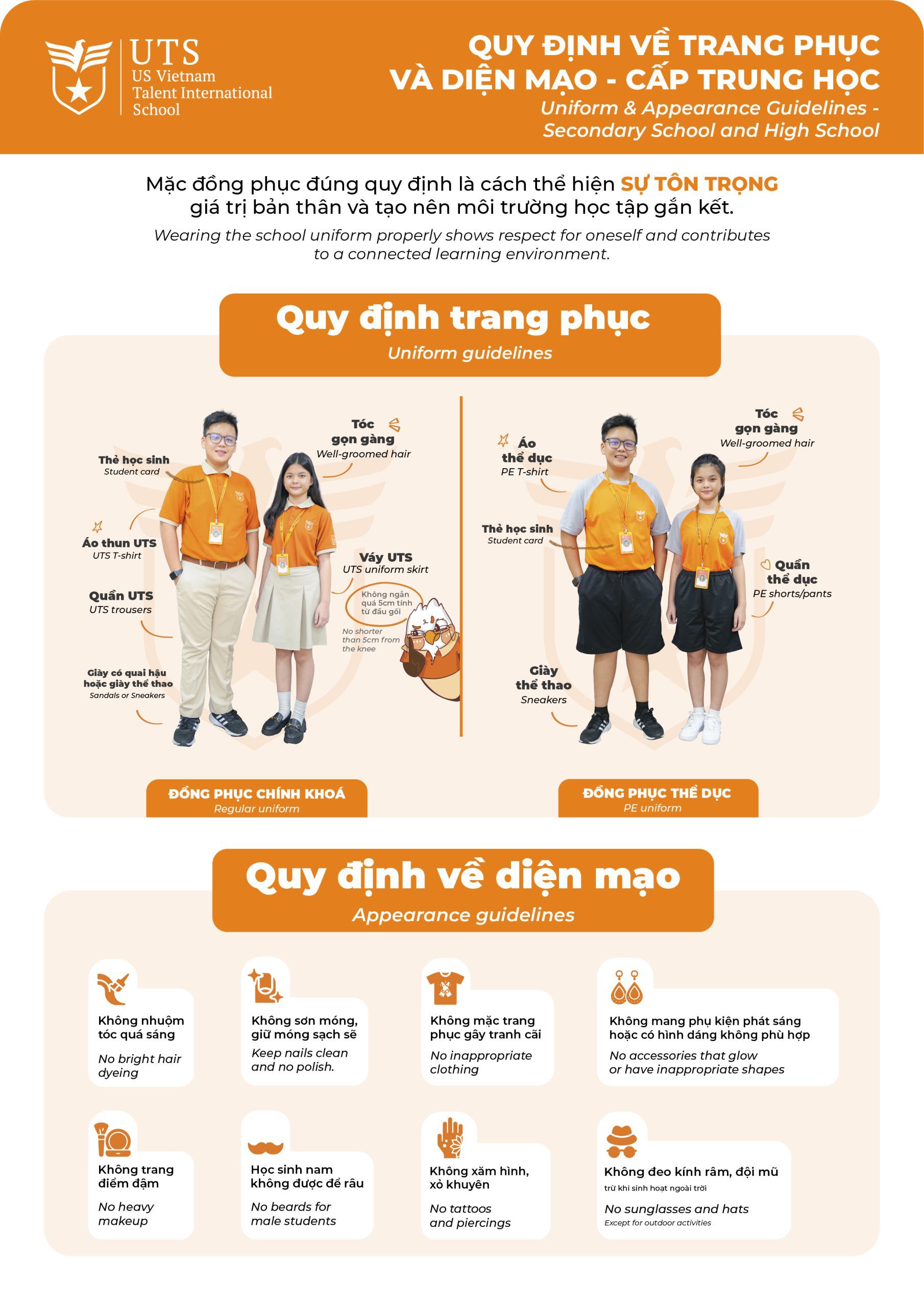
• Students always maintain a serious demeanor, avoiding behavior that displays excessive emotions towards others.
• Students demonstrate understanding by behaving courteously in both classroom and non-classroom areas.
Expected behaviors are described as follows:
*In the classroom:
- Listen when someone is speaking.
- Always show respect and behave politely towards everyone, using appropriate and courteous language with peers.
- Collaborate well with group members, working together and leading to achieve common goals.
- Avoid disruptive behaviors such as private conversations, banging on desks, throwing objects, and other actions that distract from classroom activities.
- Maintain cleanliness, dispose of trash properly.
- Take care of personal and shared property, avoiding bringing valuable items or large amounts of money to school. Students are responsible for any loss of property.
- Do not bring outside food or drinks into the classroom.
- For personal lockers, keep your items organized and respect others’ belongings; maintain the locker clean and orderly.
*Outside the classroom:
- Walk on the right side, leaving the left side for those going in the opposite direction.
- Greet adults, use polite expressions such as “thank you,” “yes,” and polite language when interacting with others.
- Maintain appropriate volume, and avoid running or playing.
- Follow safety regulations when using elevators.
- Adhere to rules in specialized rooms (e.g., Health Room, Counseling, Laboratory, Music, Art, Computer Lab, Library, Swimming Pool).
*In the auditorium:
- Arrive on time.
- Move carefully, avoiding pushing and crowding.
- Maintain order and cleanliness.
- Do not bring food or drinks into the auditorium.
* Using electronic devices:
- For elementary students: Bring personal electronic devices (phones, laptops, iPads, smartwatches, etc.) only when requested by the teacher and with parental notification.
- For secondary students: Use electronic devices for educational purposes when instructed by the teacher.
- Students are responsible for the care of their electronic devices and must take responsibility if their devices are lost or damaged.
* When on the playground:
- Play in designated areas and take care of playground equipment.
- Wear a helmet during outdoor activities to protect health.
- Place backpacks and personal items in designated areas to avoid causing trips or falls for others.
- Maintain order during games. Play moderately, avoiding actions that may hurt or endanger oneself or others.
- Report immediately to a teacher or staff member any accidents, such as dropping or breaking glass objects on the playground, or falling.
- Avoid using heat-absorbing equipment in hot, sunny weather to prevent injury.
When riding the bus:
- Follow the driver’s or caregiver’s instructions.
- Board and disembark the bus safely.
- Sit in assigned seats and wear seat belts.
- Maintain cleanliness and take care of belongings on the bus.
- Always behave politely and courteously on the bus.
- For elementary students: Parents/guardians are required to wait with their children at the bus stop until the bus arrives and must be present to pick up their children upon return.
* When in the canteen:
- Eat and drink only within the canteen area.
- Sit in designated areas, and maintain order and cleanliness in the canteen.
*When using the restroom:
- Take an appropriate amount of paper to avoid waste.
- Conserve water by turning off taps when not in use.
- Keep the floor dry, avoiding spraying or splashing water.
- Dispose of used paper in the trash bin.
MEANING MAKER
Students explore the true meaning and long-term purpose of learning for themselves and others. They act with integrity, optimism, and respect for the dignity of others. Students care about and connect with issues and ideas that have local, national, and global significance. They live responsibly and aim to serve the community, creating a positive impact, inspiring others’ lives, and the world around them. The impact of creating meaning extends beyond the present, fostering a foundation for a compassionate society and sustainable development.
- Understand global issues, and show empathy and respect for different cultures.
- Respect others’ viewpoints, listen, and provide constructive feedback when discussing topics with others.
- Be willing to support friends in both academic and personal life, and help newcomers integrate into UTS.
- Actively participate in, advocate for, and contribute to school clubs, events, and activities.
- Compete in academic or sports competitions at the school, district, city, national, and international levels.
- Participate in, organize, and provide input at workshops and community events to raise awareness about social issues
3.3. ENCOURAGEMENT AND REWARDS
The school’s system of encouragement and rewards is designed to encourage positive behaviors and honor students’ achievements across all aspects of the educational program.
This system provides teachers with flexibility in how they award recognition, observe and acknowledge positive behaviors and progress of the students they are responsible for.
Table 2. Engcouragement and Reward system at UTS
| Reward, Praise | Description |
| Praises | Praise has a positive motivating effect when it clearly explains the reasons why a student is being praised, such as actively participating in class discussions, proactively picking up litter, returning lost items, supporting classmates, etc. Praise represents recognition of positive, civilized behaviors that should be encouraged. In addition to giving direct praise to students, teachers will record the praise on an online system, which students and parents can view from home. |
| House points / Bonus points | At UTS, the House system consists of six houses: Saphire, Aquamarine, Topaz, Citrine, Emerald, and Ruby. Students can earn house points from academic activities, initiatives, and house events. Additionally, teachers can use other forms of bonus point rewards for positive behaviors that reflect the student profile during their learning process, and there are no point deductions associated with this form of reward. |
| Student of the Week |
The Student of the Week is the student who has demonstrated the most positive behaviors in learning, personal development, and participation in activities during the week. The student is recognized in front of the class, during homeroom sessions, and is honored on the class’s recognition corner. |
| Core value stickers |
With 5 positive behaviors in aspects of the six core values recognized, students receive 1 sticker. Stickers can be used as follows:
Below is the definition of UTS’s core values and examples of criteria for selecting students who represent each core value. This is not an exhaustive description, and there are many other opportunities for students to meet the standards set by the core values. Integrity Respect Courage Contribution Lifelong Learning Creativity |
| Privilege card |
Students will receive a privilege card when they accumulate 20 core value stickers, whether of the same type or different types. This card can be used within the allowed scope, such as:
|
| Outstanding Student of the Month |
The purpose of this system is to reward students who demonstrate each of UTS’s core values both inside and outside the classroom and to promote the importance of these core values in daily life. Each month, each grade level selects 6 students based on the number of stickers corresponding to the 6 core values. These students are recognized during the monthly flag-raising ceremony. |
| House reward system |
The reward categories include:
|
| Awards and Honors According to the National Education Program | Students who achieve excellent academic performance in national curriculum subjects and demonstrate strong personal development will be awarded titles according to the regulations of the Ministry of Education and Training. The school will honor these students in School Closing Ceremony. |
| Awards and Honors According to the International Program | Students who achieve excellent academic performance in international program subjects and demonstrate strong personal development will be awarded titles according to the school’s regulations. The school will honor these students in School Closing Ceremony. |
| Awards and Honors for Students with Achievements in Academic and Sports Competitions | Students who participate in and achieve notable results in district, city, national, or international academic and sports competitions will be rewarded according to the competition’s regulations. The school will honor these students in School Closing Ceremony. |
3.4. STUDENT BEHAVIOR MANAGEMENT
3.4.1. Principal
The principle in managing student behavior is to build mutual respect and require cooperation. The main purpose of establishing this principle is to promote self-discipline and guide students to take responsibility for managing their own behavior.
Criteria for developing behavior management solutions:
- Relevance: Provide solutions directly related to the behavior.
- Respect: Maintain a respectful attitude in communications and interactions.
- Reasonableness: Solutions should be reasonable and not add additional punishment.
- Effectiveness: Solutions should help students perform better and be useful in resolving the issue.
3.4.2. Procedure
The management of student behavior is approached through the steps outlined in the following table:
Table 3. Behavior Levels and Behavior Management Forms
| BEHAVIOR | FORM OF MANAGEMENT |
|
LEVEL 1 Behaviors that stem from inappropriate habits, have not yet caused serious consequences, and need adjustment.Top of Form |
|
|
1. Arriving late to school or class compared to the scheduled time. 2. Failing to prepare lessons, books, study materials, or not completing assignments. 3. Wearing incorrect uniform, not wearing a student ID badge, or violating appearance regulations. 4. Not using the designated area or position for lunchtime activities. (Applies only to secondary school students) 5. Pushing, shoving, or intentionally walking in the wrong lane in hallways, stairs, in front of elevators, the canteen, etc. 6. Using inappropriate volume levels, not adhering to the principle of one person speaking at a time. 7. Purchasing or consuming food and beverages during class or in non-designated areas (e.g., auditorium, classroom). 8. Failing to maintain the school’s/classroom’s facilities, including cleanliness and conserving electricity and water. 9. Not following regulations specific to each area (e.g., bouncing balls in the classroom, hallway; speaking loudly in the library, etc.). 10. Exhibiting inappropriate behaviors such as sleeping, lying on the desk, putting feet on the chair, talking freely, having private conversations unrelated to lessons, giving blank responses to teachers, littering, spitting; excessively teasing peers; moving around freely in the classroom; changing seats without permission; engaging in any form of cheating, etc. 11. Using inappropriate language or gestures or engaging in behavior that disrupts order in the school, classroom, and/or on the bus. 12. Using electronic devices improperly or for inappropriate purposes. (Applies only to secondary school students) Violent and Bullying Behavior: 1. Mocking or making inappropriate comments about someone else’s clothing or appearance. 2. Participating in a crowd that teases or bullies another student. 3. Taking someone else’s belongings to tease or disturb them. |
* For violations related to electronic devices: Confiscate the device along with a report and inform the student’s parents.
* For uniform violations:
|
|
LEVEL 2 Behaviors that have the potential to cause serious consequences or negatively impact others and require immediate adjustment. |
|
|
1. Repeatedly committing the same Level 1 violation for the third time within the same month. 2. Lying without causing any serious consequences. 3. Uncivilized and impolite communication, including using vulgar language. 4. Not maintaining appropriate personal boundaries, showing affection beyond friendship within the school premises and at the school gate. (Applicable only to secondary students). 5. Inappropriate attitude such as leaving the classroom without permission, refusing to cooperate with the teacher (e.g., refusing to follow instructions or persistently disrupting the teacher’s class, excessively intervening in the teacher’s authority in the classroom). 6. Disrespecting school staff through actions such as challenging or refusing to follow their instructions. 7. Playing around in the elevator. Violence and Bullying 1. Repeatedly committing the same Level 1 violation for the third time within the same month. 2. Intentionally causing trouble for others. 3. Blaming others for actions (without affecting the student’s image or reputation). 4. Calling others by derogatory names to mock or insult them. 5. Boycotting, isolating, or encouraging others to engage in similar behaviors. 6. Defaming or speaking ill of others in public. 7. Coercing classmates to serve your needs, such as doing chores, homework, or running errands for you. 8. Spreading rumors or talking negatively about others. 9. Writing or drawing negative content about someone that harms their image. 10. Using others’ belongings, money, or property without their consent. 11. Threatening to end a friendship if someone does not comply with your demands. 12. Teasing or overpowering others to the point of causing fear. 13. Sending hurtful messages through phone or the Internet. |
|
|
LEVEL 3 Serious violations that negatively impact oneself, others, or the school. |
|
|
1. Repeating the same Level 2 violation for the second time or more within the entire school year. 2. Leaving class or skipping school without a valid reason. 3. Engaging in dishonest acts that result in consequences (e.g., forging signatures, faking illness, providing inaccurate reasons to skip classes, spreading false information, etc.). 4. Dishonesty in tests and exams, including cheating, copying, and plagiarism. 5. Playing violent or dangerous games. 6. Failing to follow or intentionally misinterpreting instructions from teachers or school staff in emergencies. 7. Vandalizing personal or school property. 8. Bringing dangerous items to school, such as weapons, objects that can cause injury, or hazardous toys. Violence and Bullying 1. Repeating the same Level 2 violation for the second time or more within the entire school year. 2. Spitting at a peer. 3. Coercing peers into giving money for personal gain. 4. Racial discrimination (mocking others for their ethnic differences, skin color, language, etc.). 5. Throwing objects at others (e.g., chairs, desk items, food, etc.). 6. Deliberately blaming others in a way that affects their reputation and personal image. 7. Intentionally damaging or destroying someone else’s property or school property. 8. Being disrespectful or rude to teachers, school staff, or peers in any form (directly, indirectly via social media, the internet, electronic communication devices, etc.). 9. Posting comments, images, videos, or distorted personal secrets of others on social media or websites that cause harm or embarrassment, or negatively impact the image of others. 10. Uploading vulgar or inappropriate images or videos of oneself or others (such as clips of swearing, obscene language, or videos where one is not clothed, using vulgar language inappropriate for the age group). 11. Posting comments or content on social media that are violent, hateful, or discriminatory against any race or religion. 12. Logging into and using someone else’s online accounts without permission. 13. Impersonating others on social media in a way that negatively impacts their image. 14. Threatening to harm others or encouraging others to commit suicide on social media platforms. |
|
|
Level 4 Violations involving the law or causing particularly serious consequences are not accepted in school |
|
|
1. Repeat the same Level 3 violation for the second time within the school year. 2. Steal another person’s or the school’s property. 3. Fail to comply with fire safety regulations, such as causing tampers with fire alarms or firefighting equipment. 4. Engage in illegal activities, including smoking (including electronic cigarettes), violating traffic safety laws, possessing or using stimulants or obscene materials; participating in any form of gambling or betting; joining criminal, extortion, decadent, or subversive organizations; using weapons to engage in organized fights, cause injury to others; arrested by the police or commit other serious offenses with comparable harmful effects. Violence and Bullying: 1. Repeat the same Level 3 violation for the second time within the school year. 2. Engage in altercations, fights or intentionally causing harm to others (hitting, kicking, slapping, pinching, etc.). 3. Commit sexual harassment, intentionally touching another person’s sensitive areas, or making sexually explicit comments to others. |
|
3.5. COORDINATION PROCESS
Toàn thể Nhân viên và Giáo viên có vai trò và trách nhiệm phối hợp trong việc quản lí hành vi của học sinh, nhằm giúp các em phát triển toàn diện về phẩm chất và kiến thức.
Để những giải pháp quản lí hành vi học sinh đạt được hiệu quả thì sự đồng hành của phụ huynh là yếu tố quan trọng. Do đó, nhà trường kì vọng sự phối hợp của phụ huynh trong suốt quá trình học tập và rèn luyện của học sinh tại trường.
4. Academic Regulations
4.1. Academic Integrity
Academic integrity is a principle that promotes personal integrity and fosters respect for others and their scholarly work within an educational environment. This principle plays a crucial role in teaching and learning, ensuring fairness and providing all students with an equal opportunity to demonstrate the knowledge and skills they have acquired. Academic integrity is essential for maintaining fairness, trust, and credibility in educational institutions and within the broader community.
At UTS, we aim to create an educational environment that encourages initiative, creative thinking, and diverse methods of expressing creative ideas. In this context, academic integrity is an indispensable element for the school to cultivate a safe and supportive learning environment where students have the space and opportunity to present ideas and freely develop their thinking. Academic integrity is closely tied to the value of Integrity—one of the six core values the school seeks to instill in each student. In academics, the following behaviors are considered dishonest:
- Plagiarism involves copying others’ ideas, homework, essays, or citations from another’s work, or from reference materials, books, and the Internet. Students must cite references properly;
- Cheating during tests and exams is copying answers from other students, writing down notes, or storing materials in electronic devices or mobile phones;
- Intentionally allowing other students to copy one’s work.
Any act of academic dishonesty will be reviewed and investigated by the Academic Integrity Committee and addressed according to the school’s positive disciplinary regulations.
Building academic integrity among students is a long journey that requires the students’ self-awareness as well as the support of teachers and parents in various aspects of learning.
Responsibilities |
|
|---|---|
|
Teacherss |
Teachers are responsible for discussing academic honesty with students and encouraging them to truthfully acknowledge the resources that have supported them in completing their assignments, such as help from friends, assistance from parents, or other sources of information. Teachers should set an example by transparently citing and acknowledging the sources that have supported their teaching. |
|
Students |
Students are expected to honestly acknowledge the sources that have supported them in their learning. They are encouraged to complete their homework independently, emphasizing that the effort should be their own. |
|
Parents |
Parents are expected to understand the school's Academic Integrity policy and support its implementation by fostering an environment of trust and honesty at home. |
4.2. Academic Support Program
In line with the goal of helping students achieve their desired academic outcomes, UTS has implemented a Learning Support Program for students at the school.
We understand that each student has different backgrounds and skills, and some may struggle to adapt to the learning program at UTS. Therefore, the Learning Support Program has been designed to make the curriculum more accessible to students who have not yet achieved the expected results. These students will be allocated in supplementary classes (Tutorials) to receive additional support in strengthening their basic English skills if the International Program teachers identify this need. The small group setting allows teachers to better recognize each student’s individual needs and provide appropriate support, thereby improving their English reading and comprehension skills, enabling them to keep up with the curriculum alongside their peers.
At UTS, we believe that every student has great potential for growth, and their journey of personal development is just as important as their academic achievements. This journey helps build students’ confidence and courage to participate and integrate into their classes. This program provides opportunities for students facing challenges in the classroom to catch up with their peers in a safe, non-judgmental environment. The teachers teaching these classes are trained with the necessary skills and knowledge. UTS hopes that this program will support students in achieving the goals that both the students, their families, and the school aspire to.
4.3. After-School Tutoring
4.3.1. General Regulations
UTS teachers are not permitted to tutor students outside of school hours. If parents have arranged for their child to receive tutoring outside of school, the tutor should communicate with the homeroom teacher to ensure that the tutor can best support the student.
4.3.2. Roles of Tutors
To prevent tutors from overly interfering with students’ independent learning and to help students avoid violating the Academic Integrity policy, students and parents should clearly communicate the following guidelines to tutors:
- Tutors may assist students in understanding the terminology, content, and concepts of the subject.
- Tutors should not write any part or all of an essay, report, or review on behalf of the student.
- Tutors should not provide interpretations for students to include in their essays, reports, or reviews.
- Tutors should not write or dictate complete sentences for students to use in their assignments.
- Tutors should not perform calculations on behalf of the student.
If Parents (or students) are unclear about the appropriate behavior guidelines for tutors, they should discuss this with the teacher before the assignment is submitted. All the above behavior guidelines also apply to parents, siblings, friends, or any individual who assists with the student’s learning.
4.4. Online Learning Guidelines
4.4.1. Online Learning Regulations
Prepare equipment and space
- The required equipment for participating in online learning includes a computer (desktop or laptop), a camera, a microphone, and a stable internet connection.
- The study environment should be quiet, and free from background noise such as TV sounds, conversations, or music.
Rules for participating in online classes
- Always keep the camera on and only turn it off with the teacher’s permission.
- Always keep the microphone muted while the teacher is speaking and only unmute when requested.
- If you have any questions during the lesson, send a message to the class group. The teacher will address them afterward.
- Remember that the lesson will be recorded, including both spoken words and public messages in the group. Therefore, students should always maintain a polite and respectful attitude toward the teacher and classmates during the lesson.
Requirements for students when participating in online classes
- Secure account. If students suspect that their account is compromised, report this immediately to the School (through the homeroom teacher or the School Services Office, etc.).
- Follow the schedule provided by the homeroom teacher.
- Log in 2-5 minutes before the lesson starts.
- Prepare all necessary learning materials and review any documents sent (if any) before the class.
- Wear appropriate attire, sit nicely, and stay focused during the lesson.
- Do not use other applications that are not required by the teacher during the class.
- After the lesson, make sure to “Log Out” completely from the program.
- Inform the teacher immediately if you feel unsafe during the class.
- In some cases, students may need to visit the classroom to meet with the teacher in person when requested.
4.4.2. Online Learning Platforms
MANAGEBAC
Functions:
- Check the schedule each semester.
- Receive notifications from the Academic Board and Teachers.
- Review the grade report.
Notes:
- Use polite language and communication style.
- Secure your email address and password.
- Use the “Private Message” feature to send individual messages.
- Add interactions with the “+” icon in each message.
- Review the ManageBac user guide before using it.
ManageBac user guide HERE
MICROSOFT TEAMS
Functions:
- Connect (message, share documents, etc.) with the class
- Participate in online classes.
Notes:
- Join classes on time and do not leave the class without the teacher’s permission.
- Always keep the camera on during online classes.
- Always mute the microphone while the teacher is speaking and only unmute when requested. Additionally, students should use headphones or earphones to listen to the lecture well.
- If students have any questions during the lesson, click the raise hand icon and only unmute the microphone when the teacher calls on them to speak
Guidelines:
- Sign in Microsoft Teams
2. Join Teams classroom
3.Teams classroom functions
4.5. School Counseling
In the effort to nurture the overall safety and well-being of all members of the community, UTS strives to create an open and connected environment where community members are listened, share, and receive both physical and emotional care. The Mental Health and Counseling team at the school is established with the goal of comprehensively receiving, assessing, and supporting issues and concerns related to mental and emotional health for all Students and Parents. The counseling team is always ready to support, intervene, and counsel on situations affecting the mental and emotional health of school members, as well as to provide ongoing support after intervention.
To ensure that the support and intervention provided by the Mental Health and Counseling office are effective, safeguarding safety, happiness, and confidentiality for all parties involved, the school has established the following procedures for receiving support and counseling for each case:
4.5.1. Support and Counseling Process for Students – When Parents Proactively Seek Assistance
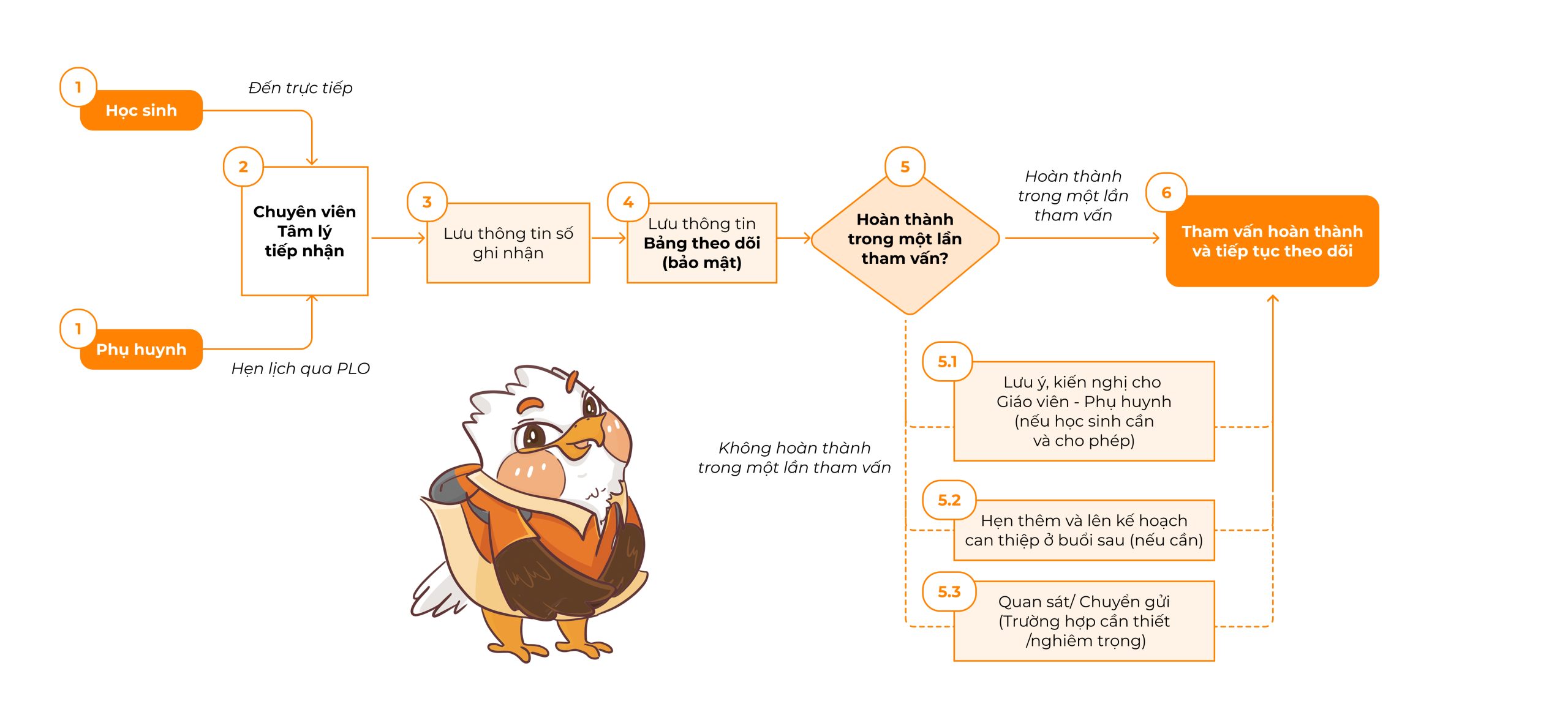
If Students or Parents notice psychological or emotional concerns and need support, they can proactively contact a counselor through the following process:
- Receiving Information
- For Students: Students can contact the psychologist directly at the Mental Health and Counseling Office or schedule an appointment through their homeroom teacher.
- For Parents: Parents can contact and arrange a meeting with the psychologist through the Parent Liaison Office (PLO).
- Counseling and Support
After receiving the information, the counselor will analyze, counsel, and support the Parents and Students. After each counseling session, the counselor will record information in the Councelling notebook and Observasion form. All counseling content and recorded information are intended for long-term support and are kept completely confidential.
In some cases, the counselor may recommend one or more of the following steps:
- Schedule additional counseling and intervention sessions in the future.
- Suggest disclosing non-identifiable information to a more experienced specialist for supervision, ensuring the effectiveness of the councelling process.
- Transfer to a more suitable psychological counseling unit or a medical unit for in-depth mental health intervention.
- Provide teachers with Notes/Recommendations for additional support at school.
After completing the counseling, the psychologist will continue to monitor and make timely and appropriate adjustments to the support and intervention as needed.
4.5.2. Support and Counselling Process for Students – When Support is Not Proactively Sought
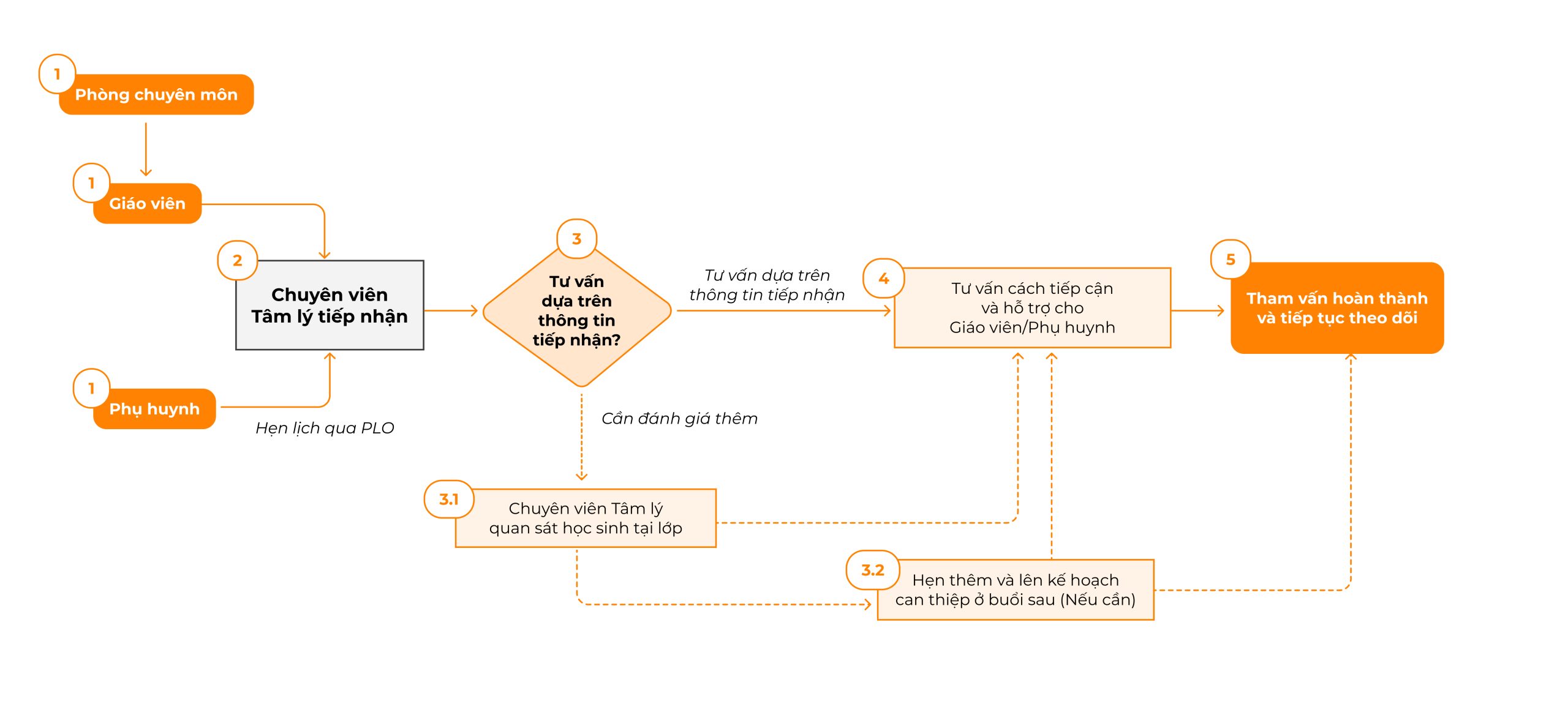
During the process of studying and daily activities, teachers, professional staff, family members, or guardians may recognize and have concerns about the psychological and emotional state of a student. In such situations, teachers, professional staff, family members, or guardians can contact a psychologist for advice on how to approach and support the student according to the following procedure:
- Receiving Information
When concerns arise about a student’s psychological and emotional state, teachers and parents can contact the School Counseling Office for support.
- For Teachers: They can either communicate directly with the counselors or send information through the Academic Department to the counsellor.
- For Parents: They should contact the Parent Liasion Office to pass the information to the counselor.
- Receiving Information and Advising on Approach
After receiving information from the relevant parties, the counselor will review, analyze, and provide advice on the approach as well as support teachers and parents in the process of advising on approach. Depending on the situation, before offering advice on the approach, the school counselor may carry out one or both of the following steps:
- Monitor the Student in Class: The counselor arranges one or more sessions to observe the student’s behavior in class to determine an appropriate approach.
- Suggest the Student Proactively Work with the Psychologist: When deemed necessary, the counselor may suggest encouraging the student to proactively work with the them. This must be done entirely on the student’s voluntary basis, and the process will be fully confidential.
- Throughout and after the counseling process, the counselor continuously monitors all feedback and progress of the approach to make necessary adjustments, updates, and provide additional advice as appropriate at each stage.
4.6. Experiential Learning Activities
Experiential Learning Activities at UTS are designed and guided by the School’s educational philosophy, aiming to nurture the 6 core values as well as to build Global Citizenship and Cross-cultural Learning spirit in students. Upon enrollment, students can choose to join clubs in various areas. Throughout their studies, they are also involved in Experiential Learning programs outside the school campus to explore additional valuable knowledge.
4.6.1. Club System
Activity Schedule:
Clubs will take place from Monday to Thursday each week, within the School’s campus.
– Open Clubs (No Fee): 15:50 – 16:30
– Intensive Clubs (Fee Required): 15:50 – 16:50
Club Information
UTS organizes Clubs so that students can choose to participate according to a fixed weekly schedule. These Clubs enable students to experience new knowledge and skills outside of the regular curriculum. The Clubs are taught by a team of qualified Teachers/Coaches, allowing students to fully develop their talents and interests, as well as providing them with valuable relaxation time and opportunities to connect with peers in their grade. The Clubs at UTS include the following main groups:
- Art Club: Guides students to experience various art subjects such as Embroidery, Music, etc.
- Sports Club: Guides students to experience various sports subjects such as Badminton, Football, etc.
- Skills Club: Guides students to practice useful skills such as MC, Life Skills, etc.
- Thinking Club: Guides students to develop logical thinking and problem-solving skills, such as
- Cognitive Math, Fun Science, etc.
- Intensive Club: Includes various subjects, allowing students to practice in-depth and refine their skills further.
4.6.2. Experiential Learning Activities
To provide students with valuable practical experiences and build connections with the surrounding community, thereby promoting Global Citizenship and Service Learning, the school regularly organizes off-campus Experiential Learning trips. These trips allow students to explore various aspects of society, such as learning about different professions, visiting culturally and historically significant sites, and addressing related issues, which complements the knowledge gained in their academic subjects.
When participating in Experiential Learning Activities, students are supervised and managed by teachers and school staff. Students are guided to adhere to the school’s principles, expectations, and safety standards at all times. Throughout the Experiential Learning process, school medical staff and teachers are always available to support any health-related situations.
4.7. UTS House System
The House System at UTS is an integral part of the UTS’ commitment to providing a comprehensive education. For this reason, participation in the UTS House System is mandatory for all students and staff.
A school’s House System plays a crucial role in creating a well-rounded development environment. Throughout the school year, the school will organize a variety of House competitions and events to encourage team spirit, a sense of responsibility, individual talents, and most importantly, to strengthen friendships within the class and foster close connections between different grade levels. The House Activities Program focuses on the following aspects:
Global Citizenship and Sustainability
- Safety and Well-being
- Intercultural Learning
The UTS House System consists of six Houses, each named after a precious gem. These names were chosen with the belief that each student is a precious gem, possessing unique qualities, colors, and potential. The mission of the educators at UTS is to polish and nurture these talents so that students can shine brightly.
Upon enrollment, all students will be assigned to a House (except for grades 1-2) to ensure that each House has a balanced number of students across all grades, fostering diversity and inclusivity in every aspect. If a student has siblings, all siblings will be assigned to the same House to facilitate orientation and familiarization. Once assigned, students will remain in the same House throughout their school years.
Students will be randomly assigned to Houses to ensure an even distribution of boys and girls and a balanced number of students across grades in each House. This method aims to create equilibrium among the Houses, thereby promoting a spirit of healthy competition.
The school expects all students and teachers/staff to wear their House shirts on days when House competitions and events are held. This action serves as a tangible symbol of each individual’s connection to their House and fosters unity and close friendships among participants.
4.7. UTS Student Council
4.7.1. Objectives
Each academic year, the Student Council (SC) is established with members representing the UTS student community, aiming to:
- Foster school spirit and promote positive messages within the UTS student community.
- Provide a practical environment for students to demonstrate confidence, leadership, task coordination, and develop teamwork skills effectively.
- Serve as a bridge between students and the school, ensuring that student voices are heard and concerns regarding academics, school life, and events are addressed in a timely manner.
4.7.2. Student Council Structure
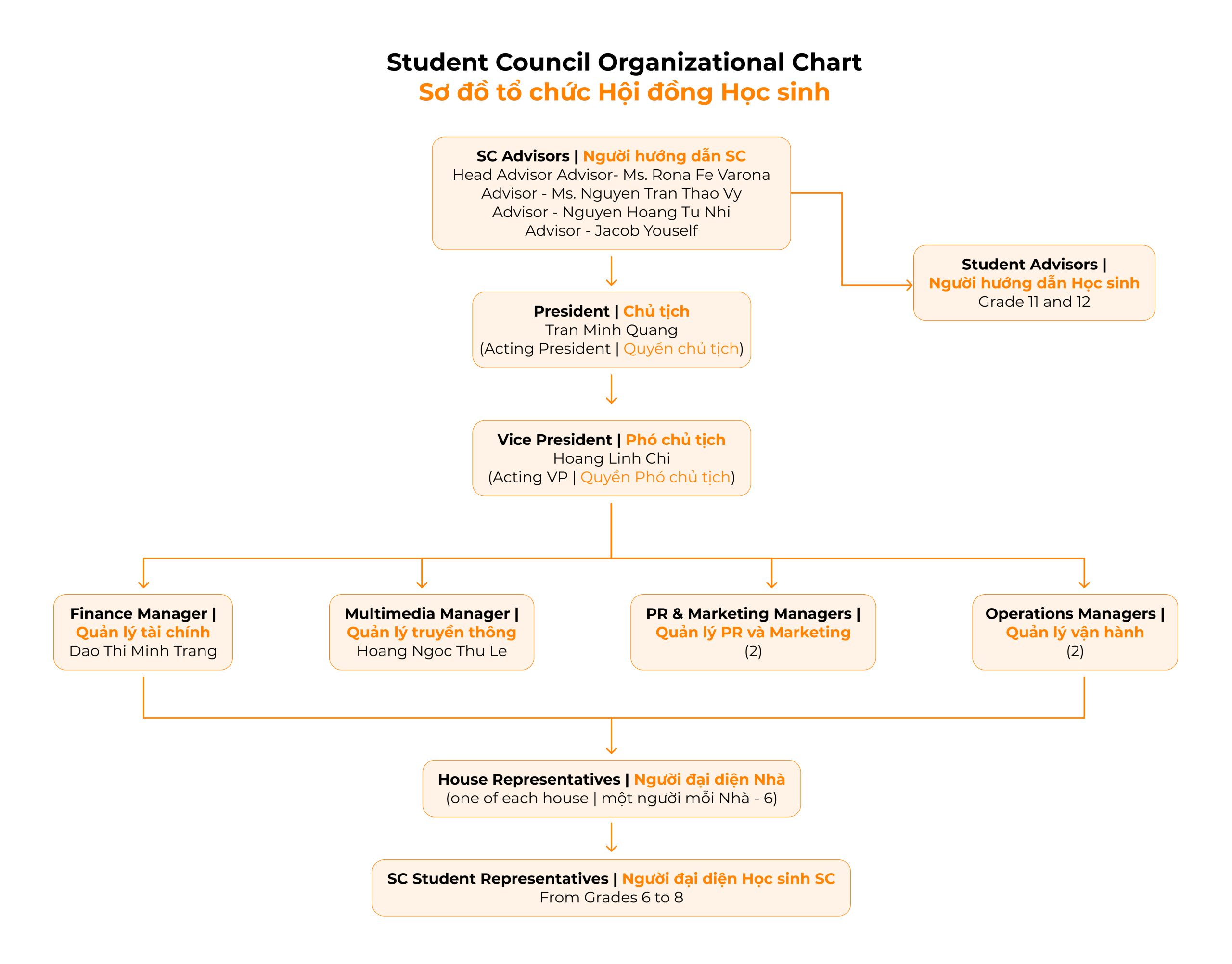
4.7.3. Roles of the Student Council
The Student Council (SC) plays a crucial role in representing and protecting students’ rights while organizing initiatives to enhance the learning experience. The SC consists of 15 members, including:
- President (1)
- Vice President (1)
- Finance Manager (1)
- Operations Managers (2)
- PR & Marketing Managers (2)
- Multimedia Managers (2)
- House Leaders (6) (representing each House)
4.7.4. Nomination Criteria and Participation Requirements
Participants: Students from Grade 9 to Grade 11. To ensure that only the most passionate and capable students are nominated for positions in the Student Council (SC), the following criteria will be applied:
- Previous Experience: Candidates for President, Vice President, or Student Council member positions must have prior leadership experience. Roles such as student representative, class president, or House
- Leader will be considered strong advantages.
- Academic Performance: Candidates must maintain strong academic records to ensure that Student
- Council responsibilities do not negatively impact their studies.
- Disciplinary Record: Candidates must have a clean disciplinary record with no violations in the current and previous academic years.
- Teacher Recommendations: Candidates must provide at least two recommendation letters from teachers, including their homeroom teacher and a subject teacher, to verify their leadership potential and character.
4.7.5. Election Process
SELECTION OF PRESIDENT AND VICE PRESIDENT
The President and Vice President of the Student Council play a crucial role in representing students’ concerns and driving positive change within the school community. They serve as leaders, role models, and advocates for students, fostering unity, school spirit, and collaboration. The President and Vice President are responsible for organizing events, leading meetings, and working closely with the school administration to address student needs and enhance the overall school experience. Their dedication, vision, and ability to inspire significantly contribute to the growth and success of the Student Council and the school.
To achieve this goal, selecting a President and Vice President with prior Student Council management experience, a strong commitment to student representation, and outstanding leadership skills is essential for effectively guiding Council members and the student body.
Interim Leadership
For this academic year, two existing Student Council members have been appointed as interim President and Vice President. They were chosen based on their previous student leadership experience and their role in last year’s Student Council, where they demonstrated dedication and strong leadership skills for the benefit of both the Council and the student body. Additionally, both have spent part of their summer break assisting Student Council Advisors in strategizing for future Council programs.
Nomination Phase
Interested candidates must submit a nomination application, outlining their vision for the school and their leadership strategy.
Candidates must also provide a portfolio detailing their contributions to the school community, leadership experience, and extracurricular activities.
Campaign Phase
Approved candidates will create campaign materials, including a presentation video, which will be shared with the entire student body.
A live debate or Q&A session may be held, where candidates present their platforms and answer questions from students and teachers. (optional)
Election Process
Voting will be conducted through a reliable online platform (e.g., Microsoft Forms) to ensure each student can only vote once.
All students from Grades 9-12 and teachers are eligible to vote.
Results will be verified by the Head of Student Affairs and SC Advisors.
Announcement
The elected President and Vice President will be announced during a school-wide assembly and through the school’s official communication channels.
Expectations and Training
The selected students will undergo a short training session led by the Head of Student Affairs and SC Advisors, covering their roles, responsibilities, and the importance of student representation.
SELECTION OF STUDENT COUNCIL MANAGERS, INCLUDING HOUSE LEADERS
Application Stage
Candidates for SC Manager positions must complete an application form, which includes questions about their leadership experience, goals for their role, and ideas for student engagement.
Applicants must also submit a teacher recommendation letter.
Preliminary Selection Stage
A committee consisting of Vice Principals, the Head of Student Affairs, SC Advisors, and selected teachers will review applications and shortlist the top five candidates for each position.
Selection criteria include leadership potential, commitment to student life, and alignment with the school’s values.
Campaign Stage
Shortlisted candidates will create a campaign video to introduce themselves and share their vision.
These videos will be shared with the student body.
Election Process
Voting will be open to all students and conducted through a reliable online platform.
Votes will be counted, and results will be confirmed by the selection committee.
Announcement
Elected candidates will be publicly announced during a school assembly, on the SC fan page, the school’s official website, and through email notifications.
Expectations & Training
Selected students will undergo a brief training session led by the Head of Student Affairs and SC Advisors, covering their roles, responsibilities, and the importance of representing their peers.
SELECTION OF SC REPRESENTATIVES
Nomination and Selection
Each class (Grades 6-8) will select one representative. This process will be conducted openly, and candidates must be nominated by their homeroom teacher. The homeroom teacher will also oversee the process to ensure fairness.
Students interested in becoming class representatives will present their reasons for selection to their classmates. (Optional)
Expectations & Training
Selected students will undergo a brief training session led by the Head of Student Affairs and SC Advisors, covering their roles, responsibilities, and the importance of representing their peers.
Ongoing Support
Regular meetings with the SC will be held to ensure that class representatives are effectively fulfilling their roles and addressing student concerns.
4.7.6. Transparency and fairness
To ensure the election process is fair and transparent:
- Supervision: The entire process will be overseen by the Student Affairs Supervisor and SC Advisors to ensure compliance with guidelines and to address any disputes if they arise.
- Feedback Mechanism: After the election, feedback will be collected from students and teachers to evaluate the process and identify areas for improvement.
- Inclusion: Efforts will be made to encourage diverse participation in the elections, ensuring representation of different student groups.
This election process aims to select student leaders who are not only capable and experienced but also dedicated to representing and enhancing the student experience. By involving both students and teachers in the selection process, we ensure that the chosen leaders are well-rounded, committed, and reflective of the school’s values and mission.
5. Facilities and Resources
5.1.General Regulations
5.1.1. Maintenance of Shared Property
School property is provided to serve the purposes of teaching and learning. Proper use and maintenance of school property ensure that all members of the school have equal opportunities to access and use these shared resources. Therefore, all students must be conscious of and contribute to the preservation of school property.
Students who cause damage to school property will be required to pay for the repair or replacement of the damaged items.
The policy will be communicated in writing for each specific case.
5.1.2. Foods and Beverages On School Premises
Students are not allowed to bring food or beverages (except plain water) onto the school campus. However, students who are on a self-catering meal plan are permitted to bring their own breakfast, lunch, and afternoon snacks to be consumed in the canteen.
Chewing gum is strictly prohibited on campus and on school buses.
Note: The school’s policy is not to organize individual birthday celebrations for students. Instead, homeroom teachers will acknowledge and celebrate all students with birthdays in the same month during class community sessions.
5.1.3. Pets
Except for educational purposes with prior permission from the school administration, pets are not allowed on the school premises under any circumstances or at any time.
5.2. Lost and Found
5.2.1. Personal Property Management
All students are responsible for managing their personal property. The school advises against bringing valuable items such as large sums of money or valuable objects to class. It is the responsibility of each student to safeguard and protect their personal belongings; the school is not responsible for any loss of personal property.
A UTS model demonstrates honesty and respect in both academic and daily life. Students who find lost items should return them to their owner or submit them to the school office. Students found stealing other people’s belongings will face the highest level of disciplinary action.
5.2.2. Use of Lockers
Each student is provided with a personal locker. Lockers must be kept clean, tidy, and organized; writing or drawing on lockers is prohibited. Students who intentionally write, draw, or damage their lockers will face disciplinary action according to school regulations.
Items in a student’s locker are considered personal and confidential. Therefore, students have the right to report to the school to prevent any intentional breaches of their own or others’ lockers. Intentional breaches of someone else’s locker will result in disciplinary action according to school regulations.
Students are not allowed to store food, drinks, pets, or hazardous items in their personal lockers.
Before the end of the school year, students must clean their lockers and remove all items from them. After the school year ends, the school will conduct an inspection and thorough cleaning of the locker system to prepare for the new school year. Any items left in the lockers at this time, if not reported as lost by the students, will be discarded by the school. Any damage to the lockers discovered at this time will be investigated, addressed, and disciplinary action will be taken according to school regulations.
5.2.3. Personal Belongings
All personal items must be clearly labeled with the owner’s name. Students are responsible for safeguarding their personal belongings and should keep books and study materials organized and in good condition.
If it is necessary to carry a large amount of money, students must hand it over to their Homeroom Teacher or Supervisor and sign the asset deposit log.
5.2.4. Handling Lost Items
In the case of a lost personal item, students must immediately notify their Homeroom teacher or the Academic Board.
For lost items found in public areas, students or staff should hand the items over to the School Office. Students who frequently request assistance in finding their lost items may be reminded of their own carelessness.
After 30 days from the date the lost item is received, any items that remain unclaimed will be donated to the Student Volunteer Association for charitable activities. UTS is not responsible for lost items that are not reclaimed.
5.2.5. Important Notes
UTS will assist in investigations but is not responsible for lost or stolen items. In special cases, the school reserves the right to conduct random checks of students’ lockers (under the supervision of the Homeroom Teacher, School Security, and a student representative).
5.3. School Transportation
UTS organizes a school bus service for all grade levels to increase convenience for students. Parents need to contact the Parent Liaison Office (PLO) to register their children for the service. The School Service Office, along with bus supervisors, will continuously monitor the service to ensure student safety and well-being throughout the journey.
5.3.1. Transportation Rules and Regulations:
5.3.2. General Information on the Transportation Services:
UTS organizes the school bus service for all grade levels to enhance convenience for students.
For detailed information about the service, parents are encouraged to visit the following links:
- UTS School Bus Rules
- List of bus stops at UTS Van Lang Campus
- List of bus stops at UTS South Saigon Campus
5.3.3. Registering for Transportation Services:
Parents should contact the Parent Liaison Office via hotline (028) 710 27788 or email at office@utschool.edu.vn to register their children for the service.
If any changes in the bus route are needed, parents should notify the Parent Liaison Office at least one week in advance. The office will survey the new route and inform parents about the possibility and any applicable fees after adjustments.
5.3.4. Cancelation of Transportation Services
If a student stops using the bus service, parents must notify the school by filling out a form or sending an email to office@utschool.edu.vn before the 15th of each month.
5.4. Library
The UTS library is well-equipped with resources for student research and learning.
OPERATING HOURS
Monday to Friday: 7:45 AM – 5:00 PM.
LIBRARY REGULATIONS:
Students are responsible for the books they borrow and must take care of them both at school and at home.
Students can borrow up to two books at a time.
Books can be borrowed and returned after two weeks. After this period, students must return or renew the books at the library. Students with overdue books cannot borrow additional books.
5.5. Canteen and Meal Services
The school’s meal service is provided by a professional catering company. Meals are prepared and cooked daily at the school to ensure food safety and a balanced diet for all students.
5.5.1. Registration for Meal Services
Parents are required to contact the Parent Liaison Office (PLO) via the hotline (028) 710 27788 or email office@utschool.edu.vn to register for the student’s meal service.
For students registering at the beginning of each semester, the meal fee must be completed at least 7 days prior to the start of the service.
For students registering mid-year, the meal fee must be completed at least 2 days prior to the start of the service.
If a student has a history of allergies or any specific health-related conditions, parents are kindly requested to provide full information to the Parent Liaison Office (PLO) through the School Service Information Form (submitted during enrollment) or by updating the information via email at office@utschool.edu.vn.
5.5.2. Cancelation of Meal Services
5.5.3. Fee Policy
Meal service fees will be refunded in the following cases:
- Parents must submit an absence request through the ManageBac system at least 24 hours in advance, counted from 9:00 a.m. on the day the credit is to be applied.
Example: For an absence on Wednesday, the request must be submitted before 9:00 a.m. on Tuesday. - In cases where a student is registered for the school meal service but must consume a special meal prepared by the family as prescribed by a doctor, parents are kindly requested to notify the school and provide supporting documentation at least 24 hours in advance, counted from 9:00 a.m. on the day the meal service is temporarily suspended.
This information should be sent to the homeroom teacher or the Parent Liaison Office (PLO) via the hotline (028) 7102 7788 or email office@utschool.edu.vn.
Refunds will be calculated on a daily basis, and any credited amounts will be settled at the end of the academic year.
5.5.4. Guidelines for School Meals Participation:

– Parents and students are required to place meal orders for the entire month according to the guidelines provided here. This should be done regularly between the 19th and 25th of each month via this link.
– Parents and students can review the selected menu and access the student’s daily meal participation history through the same link.
– In addition to the daily main meals provided, parents and students can recharge the student’s card account with additional fees to purchase snacks and beverages at the UTS Snack Counter (as needed).
– The use of the Student Card for accessing the Meal Service is mandatory. In cases where the Student Card is forgotten or lost, students should contact the School Services Office for assistance in obtaining a meal voucher.
– For students with a history of allergies or other special health considerations, parents are requested to provide complete information to the School Services Office via the School Services Information form when enrolling or by updating the information through email: office@utschool.edu.vn.
5.5.5. Notes for Students Bringing their Own Meals:
-
Self-Catering Confirmation:
Parents are kindly requested to complete the Self-Catering Confirmation Form and submit it to the Parent Liaison Office (PLO) or via email at office@utschool.edu.vn at least two (2) working days prior to the start of each term/semester. By submitting the form, parents agree to take full responsibility for any issues that may arise from consuming food not provided by the school. -
Bringing Food from Home:
Parents and students should prepare and bring food from home at the beginning of the school day. The school does not accept, store, or refrigerate any food or beverages. -
Designated Area and Facilities:
The school provides a designated area for students to place their food and microwaves for reheating. Therefore, parents are advised to prepare food in microwave-safe, food-grade containers suitable for student use.
6. Health and School Safety
6.1 ID Cards and Usage Regulations
School safety is always a top priority at UTS. Therefore, all security control within the UTS campus is implemented through the issuance and application of identification cards for the entire community. The types of identification cards used at UTS are as follows:
6.1.1. Student ID Cards
Applicable to: All students at UTS.
Purpose of Use: Identification card.
– To identify students when entering and exiting the school.
– To participate in meal services at the school canteen.
6.1.2. Parent ID Cards
Applicable to: Parents of children currently enrolled at UTS.
Purpose of Use: Parents can use the Parent ICard to access certain school services, including:
– Identifying parents when entering and exiting the school.
– Monitoring student pick-up and drop-off through the UTS Go Safe app.
6.1.3. General Regulations
The UTS identification card is the property of the school and will become invalid if the user is no longer a member of the UTS community.
The card is not redeemable for cash.
The identification card allows users to recharge with additional fees to access additional services at the UTS store and the school canteen.
6.1.4. Issuance and Replacement of ID cards
Student ID Cards: UTS students will be issued one (1) free identification card at the start of each educational level (Primary, Secondary, and High School). Each student receives one (1) card, which includes the displayed information: student ID, student name, and an associated service account linked to the student’s identification.
Parent ID Cards: Each family will be issued two (2) cards, which include the following information: student ID and student name.
If a parent or student loses or damages their card, a reissue fee is required:
– Student card: 100,000 VND per set, which includes one (1) card and one (1) lanyard.
– Parent card: 100,000 VND per set, which includes two (2) cards but does not include a lanyard.
The new card will be provided within 15 days after the payment of the reissue fee.
* Note:
– Immediately after issuing a new card, all account balances from the current card will be transferred to the new card.
–The old card will no longer be valid once it has been deactivated and replaced with a new card.
The school reserves the right to reclaim the card or refuse to issue a card to students and carry out security checks if there are suspicions or if the individual cannot be identified as a parent of the student.
6.2. Child Protection Policy
The child protection policy at UTS is established to ensure the safety and comprehensive development of students. The policy focuses on safeguarding children from abuse, preventing health deterioration, and ensuring a suitable developmental environment. The effectiveness of this policy requires coordination between teachers, staff, and child protection specialists. Prevention is the primary approach, but when necessary, the school will work with families and relevant authorities to address cases of abuse.
At UTS, child abuse and neglect are defined as follows:
- Physical Abuse: Intentional infliction of injury.
- Sexual Abuse: Coercion of a child into sexual activity.
- Emotional Abuse: Emotional maltreatment, causing negative psychological impact.
- Neglect: Failure to provide basic needs.
If there are suspicions of abuse or neglect, students may self-report, or teachers and staff who observe such issues should report them to the Child Protection Officer and complete the Incident Report Form.
The school will follow this procedure:
- Report suspicions of abuse or neglect to the Child Protection Officer using the Concern Report Form (completely confidential).
- Assist students in filing a complaint regarding abusive conduct.
- Investigate and address reports promptly and confidentially.
- Document details of injuries and incidents.
- Reports are sent to the child protection officer and are not kept in the student’s records.
Child Protection Officer Contact Information:
Please view the complete details of the Child Protection Policy here.
6.3. Student Health Care
6.3.1. School Health Office
UTS aims for students to remain healthy and energetic to excel in their studies. To achieve this, the school is equipped with a standard clinic to address students’ health needs. The school clinic staff are available during operational hours to ensure the well-being of students, teachers, and staff, maintaining close communication with the UTS Academic Board, teachers, and the canteen to ensure a safe and healthy environment for all community members. Additionally, clinic staff can perform basic first aid procedures, assist with monitoring, and guide students on punctual medication according to prescriptions provided by parents.
At the beginning of the school year, parents need to inform the school clinic about any special health conditions of their children (if applicable) so that health staff can closely supervise their physical condition.
FUNCTIONS OF THE SCHOOL CLINIC
- General health care and treatment of minor injuries on-site.
- Monitoring health conditions and preventing the spread of infectious diseases within the school community.
- Checking prescriptions and ensuring correct medication use by students.
- Performing on-site first aid.
REGULATIONS IN THE SCHOOL CLINIC
If a student shows signs of illness or injury, they will be taken to the clinic by a teacher or school staff member.
Students are not allowed to enter the clinic during class hours without permission from their homeroom teacher or subject teacher.
Students are prohibited from using electronic devices in the clinic.
Students must not use medical equipment or medication in the clinic without permission and guidance from clinic staff.
6.3.2. Regular Health Check-Up Program
Students receive a general health check-up once per academic year, with BMI measurements taken twice per academic year.
According to the regulations of the Ministry of Health and the Insurance Law, all students from Grade 1 to Grade 12 are required to have mandatory health insurance. Students can register for a health insurance card at the school. Students enrolled at UTS will receive free health insurance (in accordance with the Ministry of Health’s regulations for students who are Vietnamese nationals) and accident insurance. If students already have a health insurance card, they must provide the card number to the school.
To ensure the comprehensive care and protection of students’ health, UTS registers and provides accident insurance for all students attending the school.
6.3.4. Student Health Information
To effectively take care of student health, the school needs to have detailed information about students’ health conditions and medical history. herefore, before the start of the school year, parents are required to complete the “Enrollment Form” and the “Student Health Information Declaration Form” with details about their child’s health and any medical conditions. Parents must clearly state any illnesses or allergies that their child has. Additionally, parents are required to notify the school of any instances where the student becomes ill, has an accident, or is hospitalized.
If a student is diagnosed with conditions such as anaphylaxis or asthma, parents need to prepare and provide emergency medication to the school clinic. For example, students diagnosed with anaphylaxis should provide at least one EpiPen for emergency treatment to the school clinic. For field trips or extracurricular activities, parents should provide at least two EpiPens to the school.
6.3.5. Health Care Protocol
When a student shows signs of illness or sustains an injury, they will be taken to the school clinic for examination and assessment by medical staff. If the student has only a minor injury and does not need to go home, the medical staff will provide first aid and monitor the student in the clinic. If the student displays more severe symptoms, the medical staff will notify the homeroom teacher, who will then contact the parents to update them on the student’s condition and arrange for the student to be picked up and taken home.
INITIAL FIRST AID
The school clinic will provide initial first aid to students who fall ill or sustain injuries within the school premises or while participating in extracurricular activities organized by the school. If a student is injured or shows signs of illness, they will first be taken to the clinic for examination and assessment by medical staff. All cases of students being taken to the clinic will be recorded in the clinic’s records.
EMERGENCY CARE
If a student exhibits severe symptoms of illness or sustains serious injuries, the school will contact the parents using the phone numbers provided to confirm the need for emergency transfer to a medical facility. If the school is unable to reach the parents using the provided phone numbers, the student will be transported to the nearest medical facility for examination and treatment. School medical staff or other school personnel will remain at the medical facility until the parents arrive. In such cases, the parents will be responsible for covering all associated costs.
MEDICATION MANAGEMENT AT SCHOOL
Only the school’s medical staff has the right and obligation to manage medication at the school. School staff and caregivers do not have the right and obligation to manage medication or prescribe medication at school. When parents send medication to students, only the medical staff are allowed to supervise the student’s medication intake.
6.3.6. Medication Brought from Home
For students who need to take medication brought from home, parents are required to submit a doctor’s prescription and complete the “Medicines – Medical Supplies Registration Form” to the school clinic. The “Medicines – Medical Supplies Registration Form” should include the following information:
- Student’s full name
- Class
- Parent’s full name
- Details of the medication: Name of the medication, dosage schedule, and dosage amount
- Medication must be within its expiration date, properly sealed, and not damaged or wet. The medication container should clearly display the student’s name, medication name, and dosage.
Medication use regulations at school
The administration and support for students taking medication at school are part of UTS’s health care program. To ensure the safety and well-being of students, the School Services Office provides parents/guardians with the following guidelines and regulations regarding the deposit of medication and medical supplies:
Eligible students for medication deposit and use:
– Medication deposit and use at school are applicable for primary school students and require a prescription or a medication deposit form signed by the parent or direct guardian.
– Medication deposit and use at school are not applicable for preschool students except in cases of chronic conditions or long-term treatment as prescribed by a treating physician (with limited exceptions).
Important notes for medication deposit and use at school:
To ensure the safe and effective use of medication, to prevent poisoning, and to avoid adverse reactions caused by improper use of medication, parents are requested to observe the following regulations regarding medication use and student health care at the school:
– Medication sent for students to take at school must be accompanied by a written request and confirmation from the parent/guardian, along with a prescription that includes instructions for use. If the medication is provided with a doctor’s prescription but lacks labels, expiration date, or manufacturer information, the medical staff will refuse to accept the medication.
– The school does not accept the deposit of antibiotics, supplements, and dietary supplements (except in cases where a doctor’s prescription is provided).
– For medications that do not require a doctor’s prescription, the school will only accept symptom-relief syrups, nasal saline drops, and oral rehydration solutions.
– Medication deposit and use without a prescription from the parent/guardian are only permitted for common ailments with short-term treatment (e.g., colds, runny noses, headaches, and conditions that do not require specialized medication).
– For long-term medication that requires special storage, parents are requested to provide clear labeling.
– Medical staff will inform the Academic Board and the student’s homeroom teacher about any long-term medication use (including both prescribed and non-prescribed medication).
Procedure for accepting the deposit of and using medication at school:
– Medical staff will accept medication directly from parents at the school entrance between 07:00 and 07:40 daily, and at the school clinic during all other hours.
– If it is not possible to deliver medication directly to the school, parents may give it to the school’s transportation support staff (if the student is using the school transport service) or to the homeroom teacher.
– To ensure that the medication delivery is completed and that the student takes the correct dosage safely, parents are requested to fill out the Medicines – Medical Supplies Registration Form attached HERE or provide it along with the doctor’s prescription (valid for the examination period).
– The school clinic will refuse to allow the student to use medication at school if the medication is delivered directly by the student without written confirmation from the parent/guardian or homeroom teacher as outlined above.
6.4. Emergency Response Drills
The safety of students is a collective responsibility of the whole school. In the event of an emergency requiring evacuation or lockdown, students and visitors on campus must follow the instructions given by teachers and building staff.
FIRE SAFETY
- All school buildings are equipped with smoke detectors and fire alarm systems that meet current safety standards. When the fire alarm sounds, all students must immediately leave the building according to the instructions and guidance of their teachers. Students must not return to the building until they receive an “all safe” signal from the principal. The school conducts annual fire drills to familiarize students, teachers, and staff with the procedures.
- During a fire alarm, visitors on campus should follow the directions of building staff to be guided to the designated assembly area with other visitors.
LOCKDOWN
In the event of a lockdown, all students and visitors must follow the instructions of teachers and maintain order until they receive an “all safe” signal from the principal.
EVACUATION PLAN
- In emergency situations requiring evacuation from the building, the principal and teachers are responsible for ensuring the safety of all students.
- Once students have been moved to a safe area, parents will be immediately notified via SMS about the emergency and further details.

